Business Unit number and title Unit 7: Business Law Submission date June 12, 2021
VerifiedAdded on 2021/08/10
|31
|7002
|307
AI Summary
Primary functions & key roles of Law in general: 7 a) Functions of Law: 7 b) Roles of Law: 10 3.Case law & Statute law: 12 a) Case law: 12 b) Statute law: 13 c) Differences between Case law and Statute law: 15 Application for Vietnam : Distinguish criminal law & civil law 16 1) Criminal Law: 16 2) Civil Law: 17 3) Distinguish Criminal law vs. Government: 25 b) Primary legislation & secondary
Contribute Materials
Your contribution can guide someone’s learning journey. Share your
documents today.
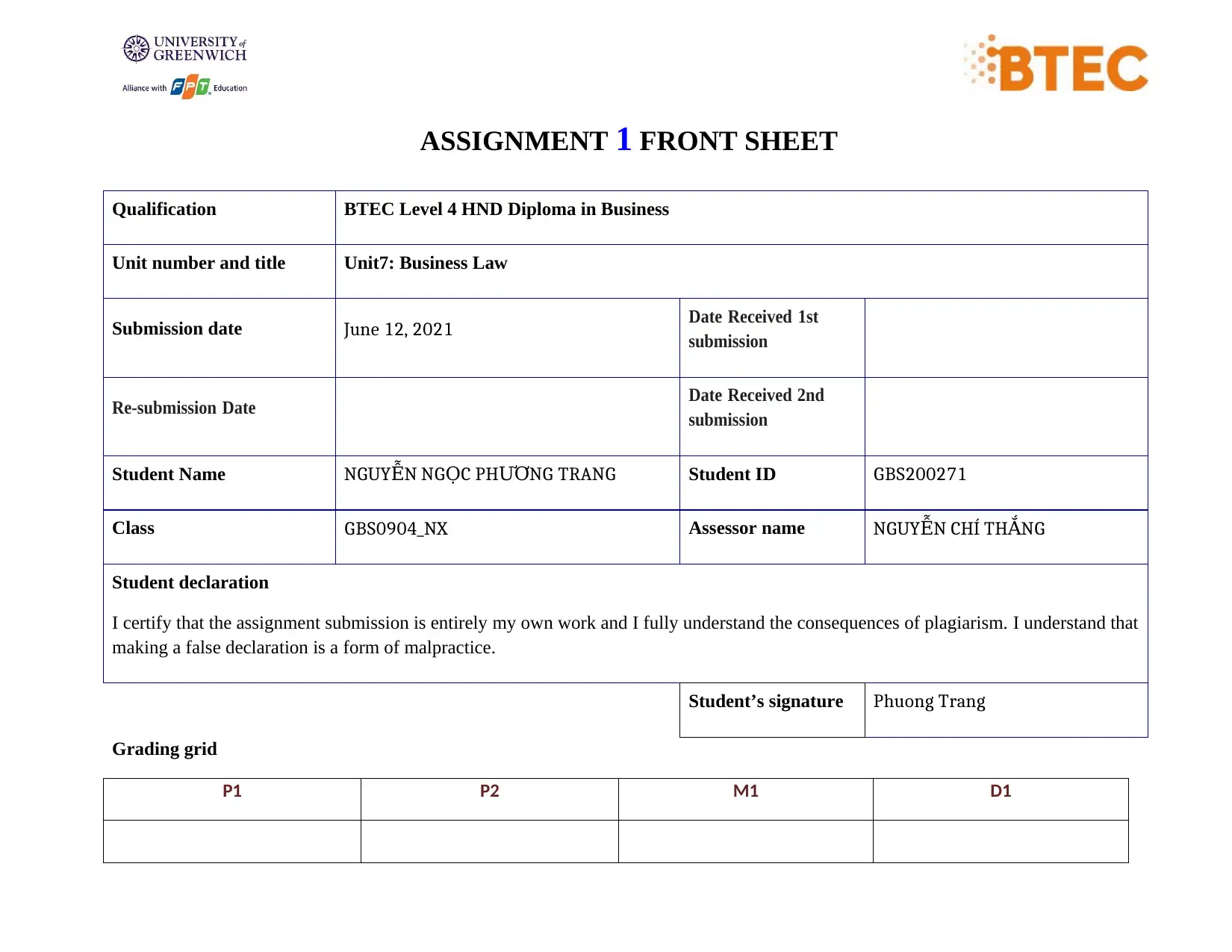
ASSIGNMENT 1 FRONT SHEET
Qualification BTEC Level 4 HND Diploma in Business
Unit number and title Unit7: Business Law
Submission date June 12, 2021 Date Received 1st
submission
Re-submission Date Date Received 2nd
submission
Student Name NGUY N NG C PH NG TRANGỄ Ọ ƯƠ Student ID GBS200271
Class GBS0904_NX Assessor name NGUY N CHÍ TH NGỄ Ắ
Student declaration
I certify that the assignment submission is entirely my own work and I fully understand the consequences of plagiarism. I understand that
making a false declaration is a form of malpractice.
Student’s signature Phuong Trang
Grading grid
P1 P2 M1 D1
Qualification BTEC Level 4 HND Diploma in Business
Unit number and title Unit7: Business Law
Submission date June 12, 2021 Date Received 1st
submission
Re-submission Date Date Received 2nd
submission
Student Name NGUY N NG C PH NG TRANGỄ Ọ ƯƠ Student ID GBS200271
Class GBS0904_NX Assessor name NGUY N CHÍ TH NGỄ Ắ
Student declaration
I certify that the assignment submission is entirely my own work and I fully understand the consequences of plagiarism. I understand that
making a false declaration is a form of malpractice.
Student’s signature Phuong Trang
Grading grid
P1 P2 M1 D1
Secure Best Marks with AI Grader
Need help grading? Try our AI Grader for instant feedback on your assignments.


Summative Feedback: Resubmission Feedback:
Grade: Assessor Signature: Date:
Internal Verifier’s Comments:
Signature & Date:
Grade: Assessor Signature: Date:
Internal Verifier’s Comments:
Signature & Date:
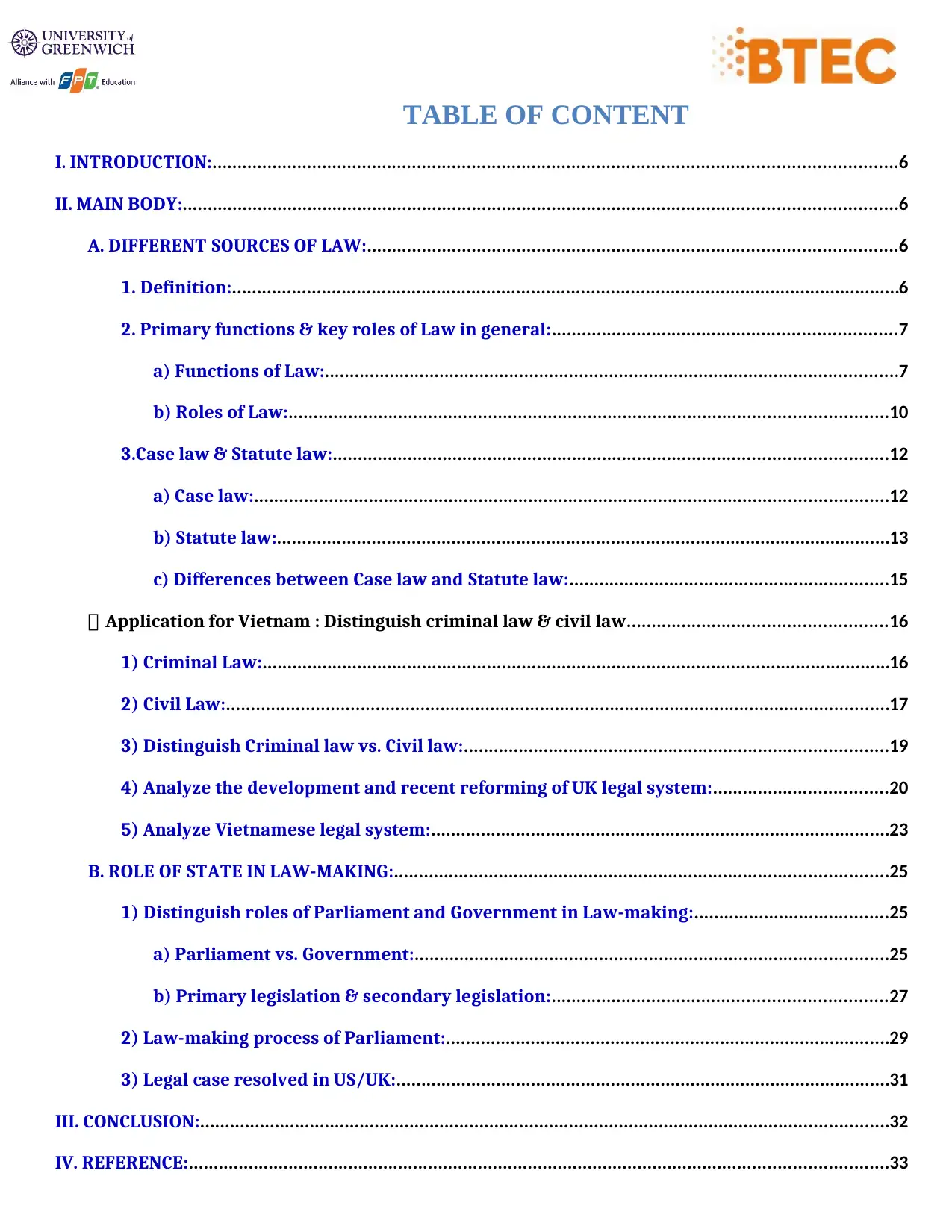
TABLE OF CONTENT
I. INTRODUCTION:.........................................................................................................................................6
II. MAIN BODY:...............................................................................................................................................6
A. DIFFERENT SOURCES OF LAW:..........................................................................................................6
1. Definition:......................................................................................................................................6
2. Primary functions & key roles of Law in general:.....................................................................7
a) Functions of Law:...................................................................................................................7
b) Roles of Law:........................................................................................................................10
3.Case law & Statute law:...............................................................................................................12
a) Case law:...............................................................................................................................12
b) Statute law:...........................................................................................................................13
c) Differences between Case law and Statute law:................................................................15
Application for Vietnam : Distinguish criminal law & civil law....................................................16
1) Criminal Law:..............................................................................................................................16
2) Civil Law:.....................................................................................................................................17
3) Distinguish Criminal law vs. Civil law:.....................................................................................19
4) Analyze the development and recent reforming of UK legal system:...................................20
5) Analyze Vietnamese legal system:............................................................................................23
B. ROLE OF STATE IN LAW-MAKING:...................................................................................................25
1) Distinguish roles of Parliament and Government in Law-making:.......................................25
a) Parliament vs. Government:...............................................................................................25
b) Primary legislation & secondary legislation:...................................................................27
2) Law-making process of Parliament:.........................................................................................29
3) Legal case resolved in US/UK:...................................................................................................31
III. CONCLUSION:..........................................................................................................................................32
IV. REFERENCE:............................................................................................................................................33
I. INTRODUCTION:.........................................................................................................................................6
II. MAIN BODY:...............................................................................................................................................6
A. DIFFERENT SOURCES OF LAW:..........................................................................................................6
1. Definition:......................................................................................................................................6
2. Primary functions & key roles of Law in general:.....................................................................7
a) Functions of Law:...................................................................................................................7
b) Roles of Law:........................................................................................................................10
3.Case law & Statute law:...............................................................................................................12
a) Case law:...............................................................................................................................12
b) Statute law:...........................................................................................................................13
c) Differences between Case law and Statute law:................................................................15
Application for Vietnam : Distinguish criminal law & civil law....................................................16
1) Criminal Law:..............................................................................................................................16
2) Civil Law:.....................................................................................................................................17
3) Distinguish Criminal law vs. Civil law:.....................................................................................19
4) Analyze the development and recent reforming of UK legal system:...................................20
5) Analyze Vietnamese legal system:............................................................................................23
B. ROLE OF STATE IN LAW-MAKING:...................................................................................................25
1) Distinguish roles of Parliament and Government in Law-making:.......................................25
a) Parliament vs. Government:...............................................................................................25
b) Primary legislation & secondary legislation:...................................................................27
2) Law-making process of Parliament:.........................................................................................29
3) Legal case resolved in US/UK:...................................................................................................31
III. CONCLUSION:..........................................................................................................................................32
IV. REFERENCE:............................................................................................................................................33
Secure Best Marks with AI Grader
Need help grading? Try our AI Grader for instant feedback on your assignments.

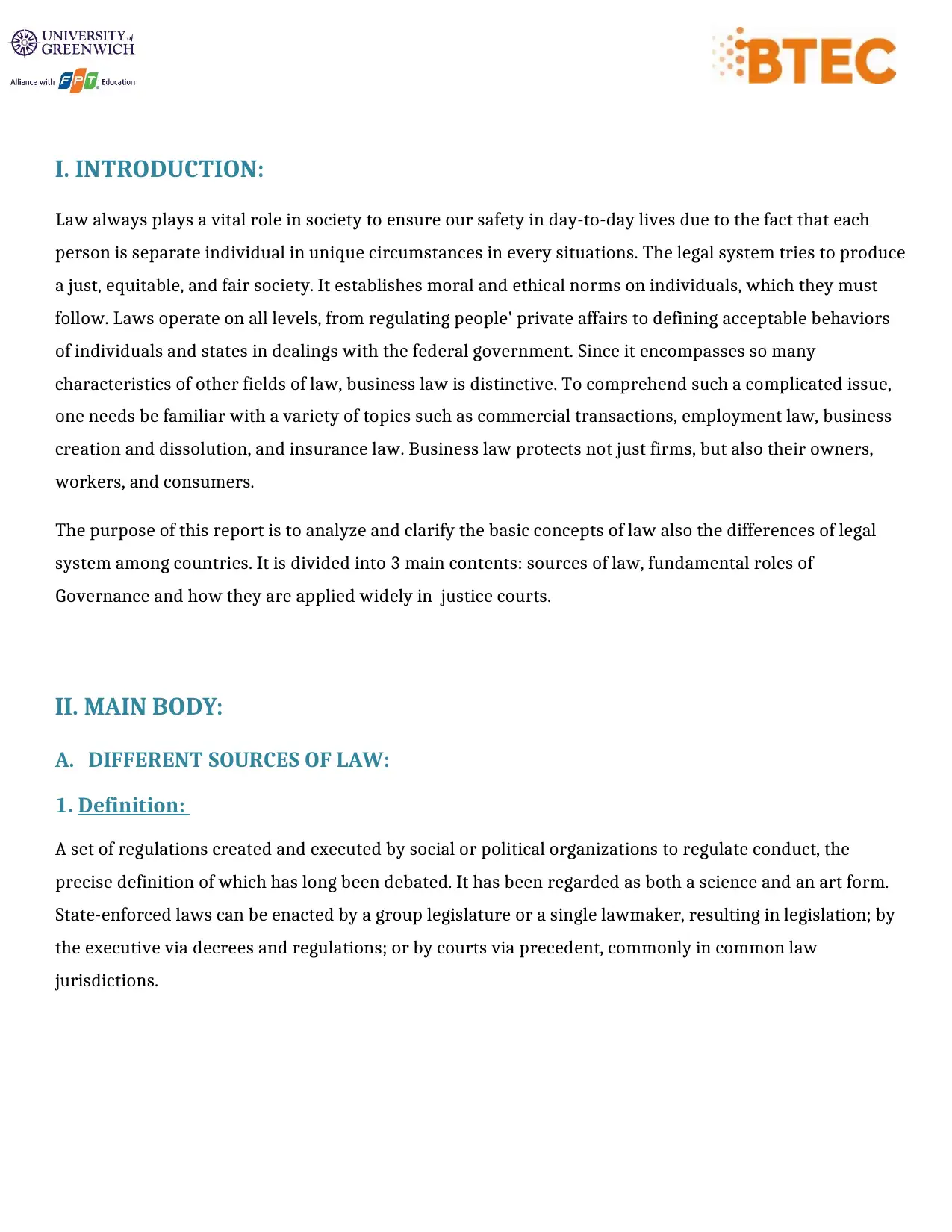
I. INTRODUCTION:
Law always plays a vital role in society to ensure our safety in day-to-day lives due to the fact that each
person is separate individual in unique circumstances in every situations. The legal system tries to produce
a just, equitable, and fair society. It establishes moral and ethical norms on individuals, which they must
follow. Laws operate on all levels, from regulating people' private affairs to defining acceptable behaviors
of individuals and states in dealings with the federal government. Since it encompasses so many
characteristics of other fields of law, business law is distinctive. To comprehend such a complicated issue,
one needs be familiar with a variety of topics such as commercial transactions, employment law, business
creation and dissolution, and insurance law. Business law protects not just firms, but also their owners,
workers, and consumers.
The purpose of this report is to analyze and clarify the basic concepts of law also the differences of legal
system among countries. It is divided into 3 main contents: sources of law, fundamental roles of
Governance and how they are applied widely in justice courts.
II. MAIN BODY:
A. DIFFERENT SOURCES OF LAW:
1. Definition:
A set of regulations created and executed by social or political organizations to regulate conduct, the
precise definition of which has long been debated. It has been regarded as both a science and an art form.
State-enforced laws can be enacted by a group legislature or a single lawmaker, resulting in legislation; by
the executive via decrees and regulations; or by courts via precedent, commonly in common law
jurisdictions.
Law always plays a vital role in society to ensure our safety in day-to-day lives due to the fact that each
person is separate individual in unique circumstances in every situations. The legal system tries to produce
a just, equitable, and fair society. It establishes moral and ethical norms on individuals, which they must
follow. Laws operate on all levels, from regulating people' private affairs to defining acceptable behaviors
of individuals and states in dealings with the federal government. Since it encompasses so many
characteristics of other fields of law, business law is distinctive. To comprehend such a complicated issue,
one needs be familiar with a variety of topics such as commercial transactions, employment law, business
creation and dissolution, and insurance law. Business law protects not just firms, but also their owners,
workers, and consumers.
The purpose of this report is to analyze and clarify the basic concepts of law also the differences of legal
system among countries. It is divided into 3 main contents: sources of law, fundamental roles of
Governance and how they are applied widely in justice courts.
II. MAIN BODY:
A. DIFFERENT SOURCES OF LAW:
1. Definition:
A set of regulations created and executed by social or political organizations to regulate conduct, the
precise definition of which has long been debated. It has been regarded as both a science and an art form.
State-enforced laws can be enacted by a group legislature or a single lawmaker, resulting in legislation; by
the executive via decrees and regulations; or by courts via precedent, commonly in common law
jurisdictions.
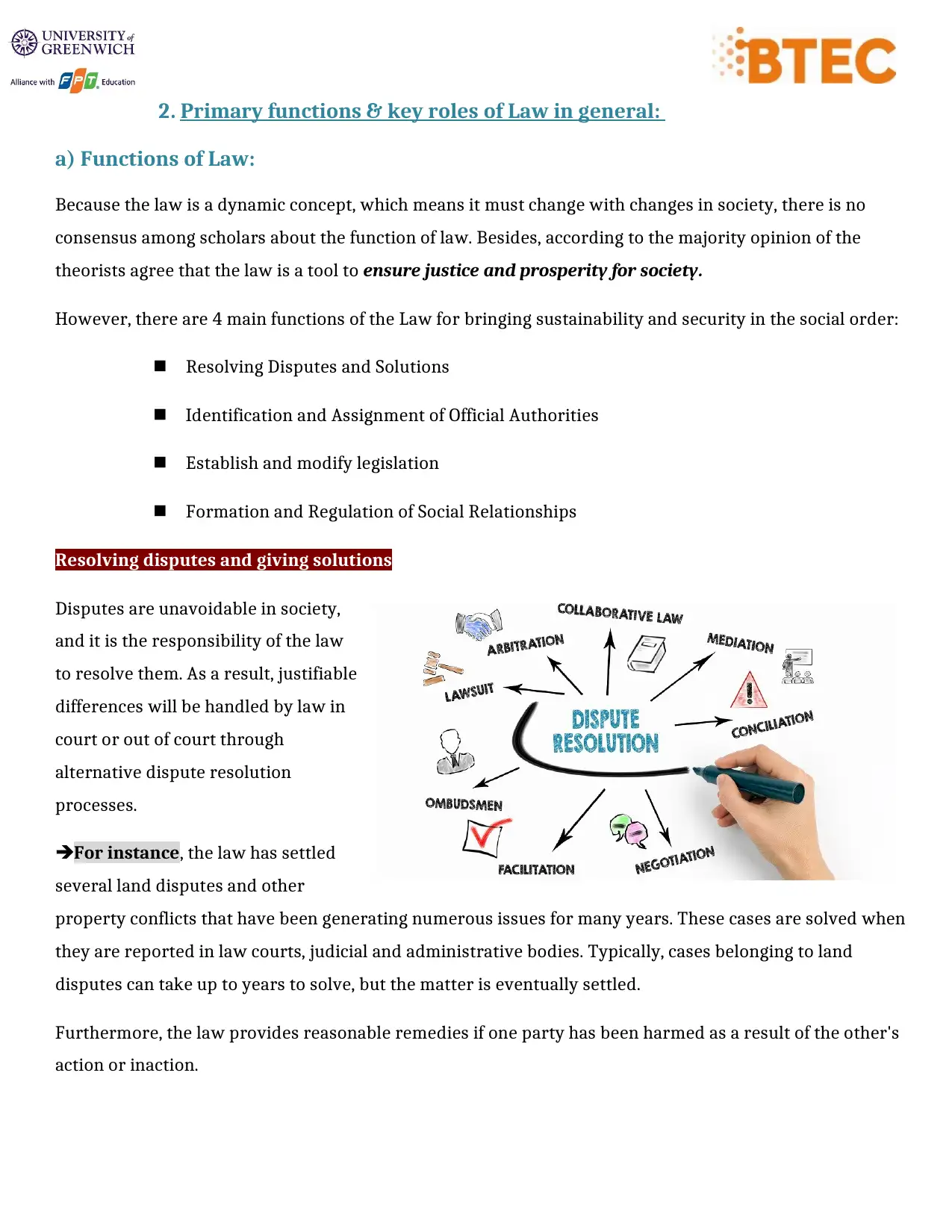
2. Primary functions & key roles of Law in general:
a) Functions of Law:
Because the law is a dynamic concept, which means it must change with changes in society, there is no
consensus among scholars about the function of law. Besides, according to the majority opinion of the
theorists agree that the law is a tool to ensure justice and prosperity for society.
However, there are 4 main functions of the Law for bringing sustainability and security in the social order:
Resolving Disputes and Solutions
Identification and Assignment of Official Authorities
Establish and modify legislation
Formation and Regulation of Social Relationships
Resolving disputes and giving solutions
Disputes are unavoidable in society,
and it is the responsibility of the law
to resolve them. As a result, justifiable
differences will be handled by law in
court or out of court through
alternative dispute resolution
processes.
èFor instance, the law has settled
several land disputes and other
property conflicts that have been generating numerous issues for many years. These cases are solved when
they are reported in law courts, judicial and administrative bodies. Typically, cases belonging to land
disputes can take up to years to solve, but the matter is eventually settled.
Furthermore, the law provides reasonable remedies if one party has been harmed as a result of the other's
action or inaction.
a) Functions of Law:
Because the law is a dynamic concept, which means it must change with changes in society, there is no
consensus among scholars about the function of law. Besides, according to the majority opinion of the
theorists agree that the law is a tool to ensure justice and prosperity for society.
However, there are 4 main functions of the Law for bringing sustainability and security in the social order:
Resolving Disputes and Solutions
Identification and Assignment of Official Authorities
Establish and modify legislation
Formation and Regulation of Social Relationships
Resolving disputes and giving solutions
Disputes are unavoidable in society,
and it is the responsibility of the law
to resolve them. As a result, justifiable
differences will be handled by law in
court or out of court through
alternative dispute resolution
processes.
èFor instance, the law has settled
several land disputes and other
property conflicts that have been generating numerous issues for many years. These cases are solved when
they are reported in law courts, judicial and administrative bodies. Typically, cases belonging to land
disputes can take up to years to solve, but the matter is eventually settled.
Furthermore, the law provides reasonable remedies if one party has been harmed as a result of the other's
action or inaction.
Paraphrase This Document
Need a fresh take? Get an instant paraphrase of this document with our AI Paraphraser
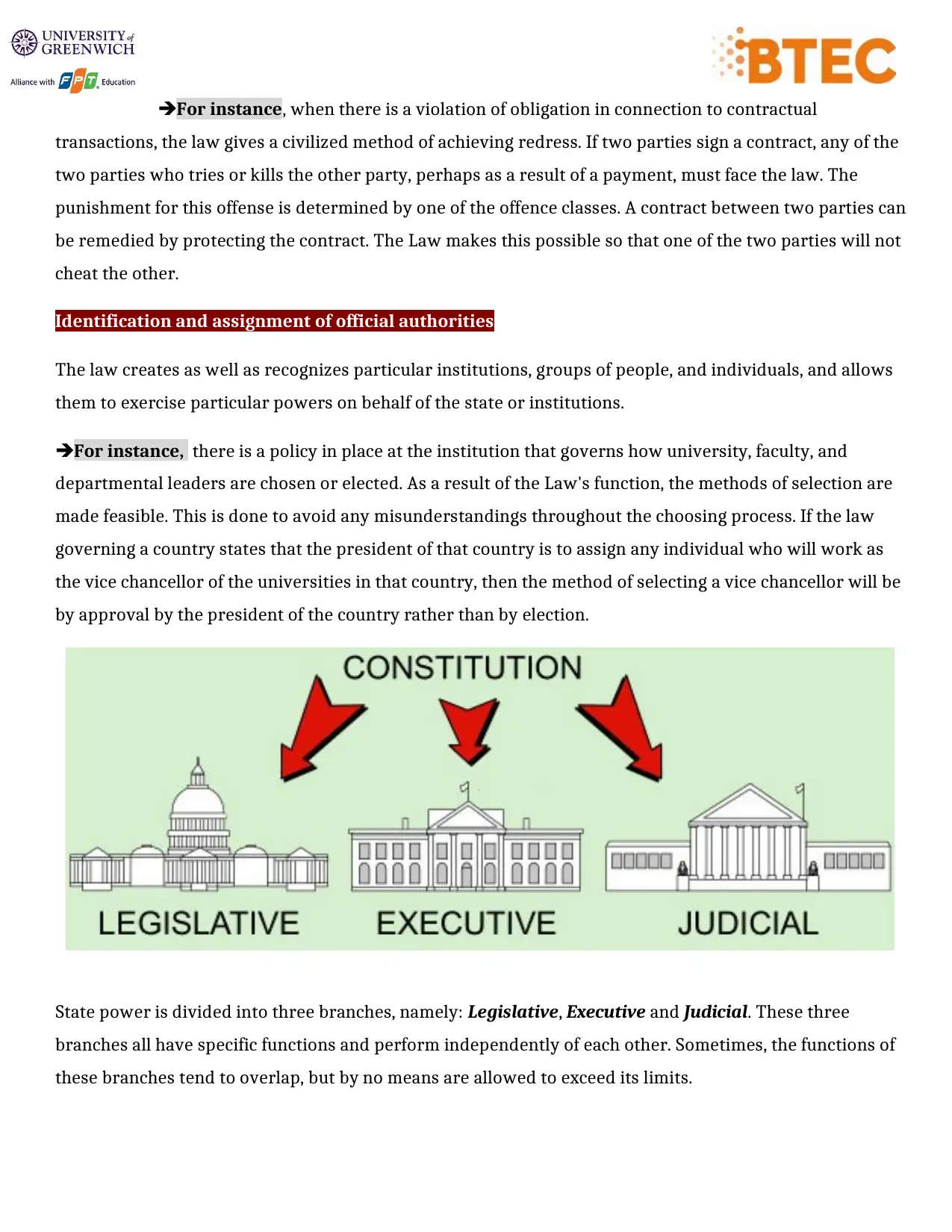
èFor instance, when there is a violation of obligation in connection to contractual
transactions, the law gives a civilized method of achieving redress. If two parties sign a contract, any of the
two parties who tries or kills the other party, perhaps as a result of a payment, must face the law. The
punishment for this offense is determined by one of the offence classes. A contract between two parties can
be remedied by protecting the contract. The Law makes this possible so that one of the two parties will not
cheat the other.
Identification and assignment of official authorities
The law creates as well as recognizes particular institutions, groups of people, and individuals, and allows
them to exercise particular powers on behalf of the state or institutions.
èFor instance, there is a policy in place at the institution that governs how university, faculty, and
departmental leaders are chosen or elected. As a result of the Law's function, the methods of selection are
made feasible. This is done to avoid any misunderstandings throughout the choosing process. If the law
governing a country states that the president of that country is to assign any individual who will work as
the vice chancellor of the universities in that country, then the method of selecting a vice chancellor will be
by approval by the president of the country rather than by election.
State power is divided into three branches, namely: Legislative, Executive and Judicial. These three
branches all have specific functions and perform independently of each other. Sometimes, the functions of
these branches tend to overlap, but by no means are allowed to exceed its limits.
transactions, the law gives a civilized method of achieving redress. If two parties sign a contract, any of the
two parties who tries or kills the other party, perhaps as a result of a payment, must face the law. The
punishment for this offense is determined by one of the offence classes. A contract between two parties can
be remedied by protecting the contract. The Law makes this possible so that one of the two parties will not
cheat the other.
Identification and assignment of official authorities
The law creates as well as recognizes particular institutions, groups of people, and individuals, and allows
them to exercise particular powers on behalf of the state or institutions.
èFor instance, there is a policy in place at the institution that governs how university, faculty, and
departmental leaders are chosen or elected. As a result of the Law's function, the methods of selection are
made feasible. This is done to avoid any misunderstandings throughout the choosing process. If the law
governing a country states that the president of that country is to assign any individual who will work as
the vice chancellor of the universities in that country, then the method of selecting a vice chancellor will be
by approval by the president of the country rather than by election.
State power is divided into three branches, namely: Legislative, Executive and Judicial. These three
branches all have specific functions and perform independently of each other. Sometimes, the functions of
these branches tend to overlap, but by no means are allowed to exceed its limits.
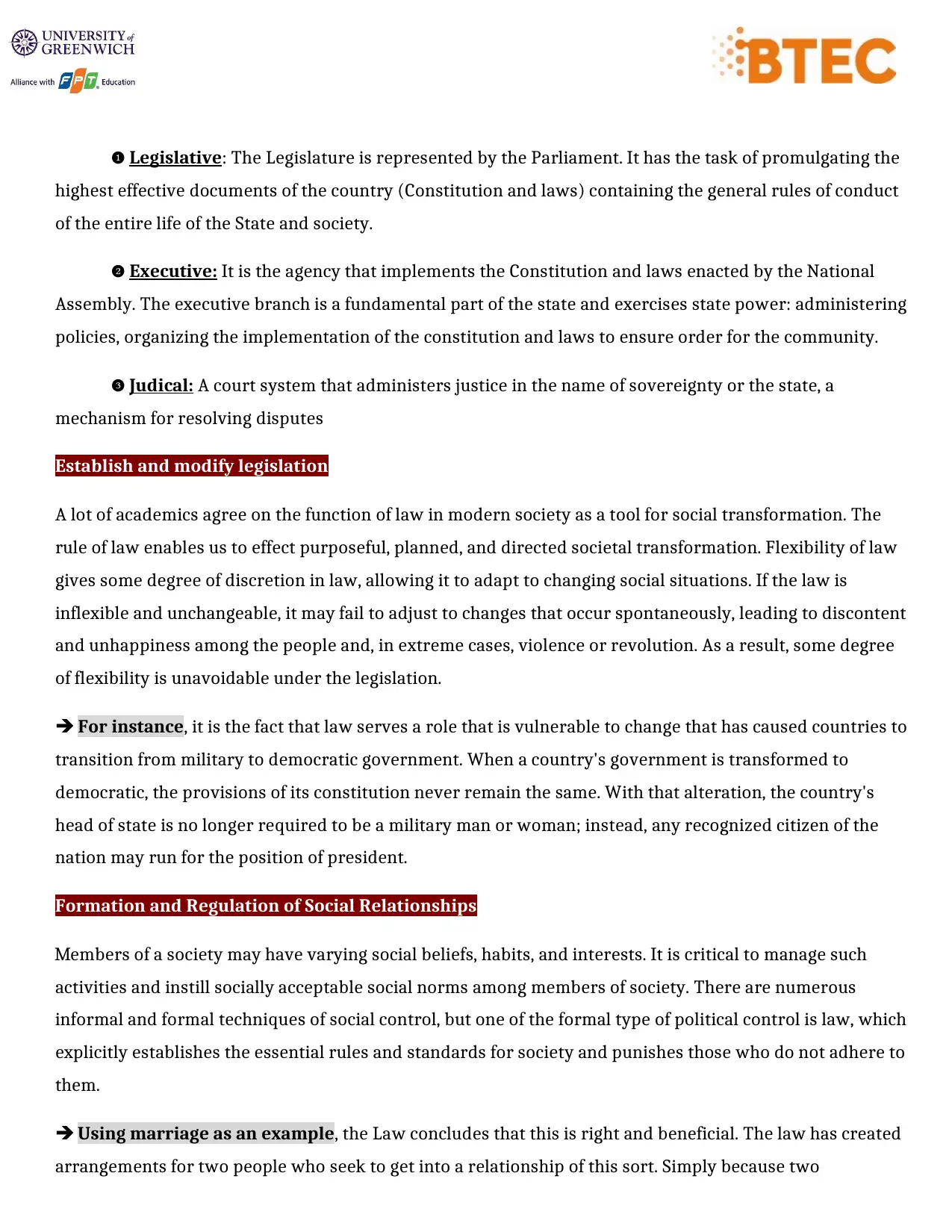
❶ Legislative: The Legislature is represented by the Parliament. It has the task of promulgating the
highest effective documents of the country (Constitution and laws) containing the general rules of conduct
of the entire life of the State and society.
❷ Executive: It is the agency that implements the Constitution and laws enacted by the National
Assembly. The executive branch is a fundamental part of the state and exercises state power: administering
policies, organizing the implementation of the constitution and laws to ensure order for the community.
❸ Judical: A court system that administers justice in the name of sovereignty or the state, a
mechanism for resolving disputes
Establish and modify legislation
A lot of academics agree on the function of law in modern society as a tool for social transformation. The
rule of law enables us to effect purposeful, planned, and directed societal transformation. Flexibility of law
gives some degree of discretion in law, allowing it to adapt to changing social situations. If the law is
inflexible and unchangeable, it may fail to adjust to changes that occur spontaneously, leading to discontent
and unhappiness among the people and, in extreme cases, violence or revolution. As a result, some degree
of flexibility is unavoidable under the legislation.
è For instance, it is the fact that law serves a role that is vulnerable to change that has caused countries to
transition from military to democratic government. When a country's government is transformed to
democratic, the provisions of its constitution never remain the same. With that alteration, the country's
head of state is no longer required to be a military man or woman; instead, any recognized citizen of the
nation may run for the position of president.
Formation and Regulation of Social Relationships
Members of a society may have varying social beliefs, habits, and interests. It is critical to manage such
activities and instill socially acceptable social norms among members of society. There are numerous
informal and formal techniques of social control, but one of the formal type of political control is law, which
explicitly establishes the essential rules and standards for society and punishes those who do not adhere to
them.
è Using marriage as an example, the Law concludes that this is right and beneficial. The law has created
arrangements for two people who seek to get into a relationship of this sort. Simply because two
highest effective documents of the country (Constitution and laws) containing the general rules of conduct
of the entire life of the State and society.
❷ Executive: It is the agency that implements the Constitution and laws enacted by the National
Assembly. The executive branch is a fundamental part of the state and exercises state power: administering
policies, organizing the implementation of the constitution and laws to ensure order for the community.
❸ Judical: A court system that administers justice in the name of sovereignty or the state, a
mechanism for resolving disputes
Establish and modify legislation
A lot of academics agree on the function of law in modern society as a tool for social transformation. The
rule of law enables us to effect purposeful, planned, and directed societal transformation. Flexibility of law
gives some degree of discretion in law, allowing it to adapt to changing social situations. If the law is
inflexible and unchangeable, it may fail to adjust to changes that occur spontaneously, leading to discontent
and unhappiness among the people and, in extreme cases, violence or revolution. As a result, some degree
of flexibility is unavoidable under the legislation.
è For instance, it is the fact that law serves a role that is vulnerable to change that has caused countries to
transition from military to democratic government. When a country's government is transformed to
democratic, the provisions of its constitution never remain the same. With that alteration, the country's
head of state is no longer required to be a military man or woman; instead, any recognized citizen of the
nation may run for the position of president.
Formation and Regulation of Social Relationships
Members of a society may have varying social beliefs, habits, and interests. It is critical to manage such
activities and instill socially acceptable social norms among members of society. There are numerous
informal and formal techniques of social control, but one of the formal type of political control is law, which
explicitly establishes the essential rules and standards for society and punishes those who do not adhere to
them.
è Using marriage as an example, the Law concludes that this is right and beneficial. The law has created
arrangements for two people who seek to get into a relationship of this sort. Simply because two
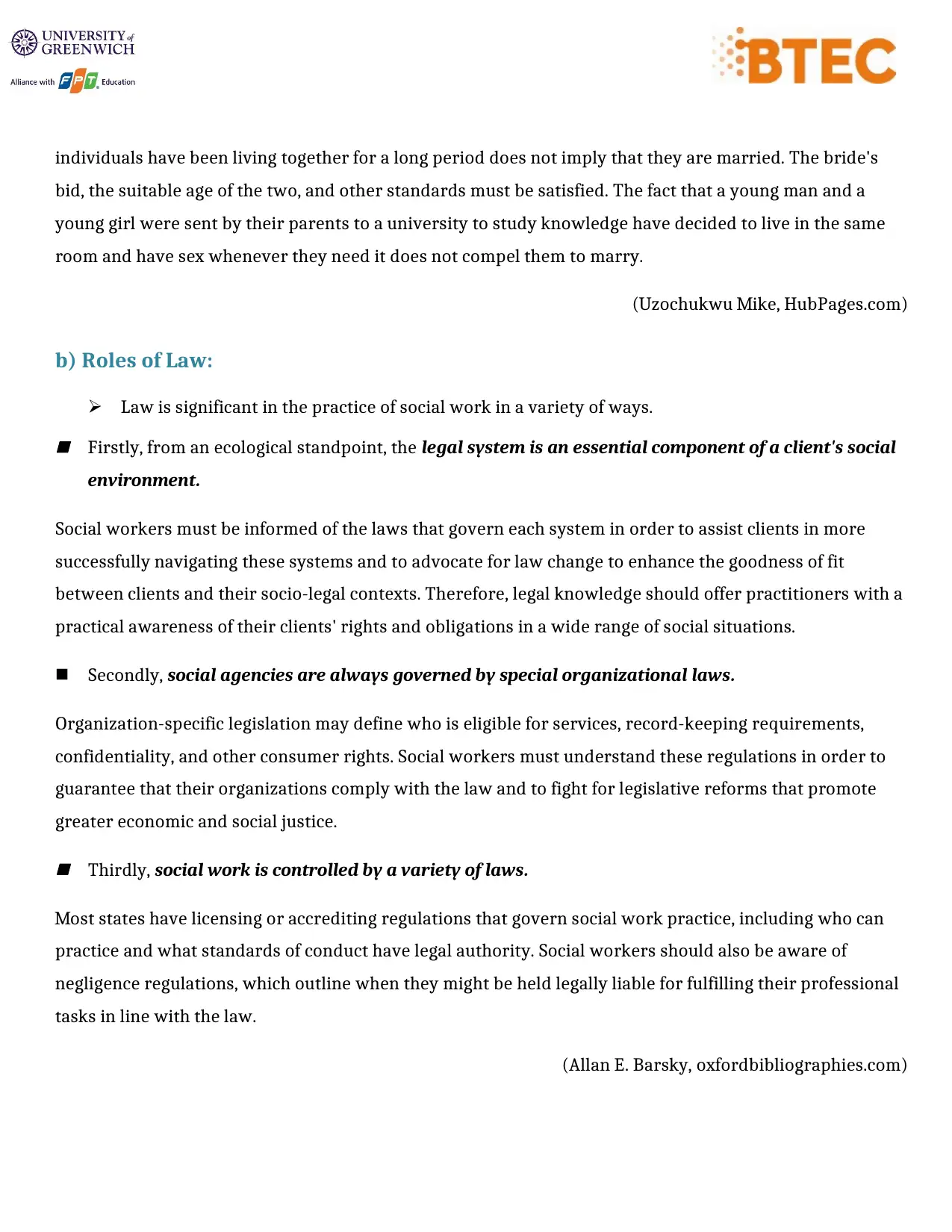
individuals have been living together for a long period does not imply that they are married. The bride's
bid, the suitable age of the two, and other standards must be satisfied. The fact that a young man and a
young girl were sent by their parents to a university to study knowledge have decided to live in the same
room and have sex whenever they need it does not compel them to marry.
(Uzochukwu Mike, HubPages.com)
b) Roles of Law:
Law is significant in the practice of social work in a variety of ways.
Firstly, from an ecological standpoint, the legal system is an essential component of a client's social
environment.
Social workers must be informed of the laws that govern each system in order to assist clients in more
successfully navigating these systems and to advocate for law change to enhance the goodness of fit
between clients and their socio-legal contexts. Therefore, legal knowledge should offer practitioners with a
practical awareness of their clients' rights and obligations in a wide range of social situations.
Secondly, social agencies are always governed by special organizational laws.
Organization-specific legislation may define who is eligible for services, record-keeping requirements,
confidentiality, and other consumer rights. Social workers must understand these regulations in order to
guarantee that their organizations comply with the law and to fight for legislative reforms that promote
greater economic and social justice.
Thirdly, social work is controlled by a variety of laws.
Most states have licensing or accrediting regulations that govern social work practice, including who can
practice and what standards of conduct have legal authority. Social workers should also be aware of
negligence regulations, which outline when they might be held legally liable for fulfilling their professional
tasks in line with the law.
(Allan E. Barsky, oxfordbibliographies.com)
bid, the suitable age of the two, and other standards must be satisfied. The fact that a young man and a
young girl were sent by their parents to a university to study knowledge have decided to live in the same
room and have sex whenever they need it does not compel them to marry.
(Uzochukwu Mike, HubPages.com)
b) Roles of Law:
Law is significant in the practice of social work in a variety of ways.
Firstly, from an ecological standpoint, the legal system is an essential component of a client's social
environment.
Social workers must be informed of the laws that govern each system in order to assist clients in more
successfully navigating these systems and to advocate for law change to enhance the goodness of fit
between clients and their socio-legal contexts. Therefore, legal knowledge should offer practitioners with a
practical awareness of their clients' rights and obligations in a wide range of social situations.
Secondly, social agencies are always governed by special organizational laws.
Organization-specific legislation may define who is eligible for services, record-keeping requirements,
confidentiality, and other consumer rights. Social workers must understand these regulations in order to
guarantee that their organizations comply with the law and to fight for legislative reforms that promote
greater economic and social justice.
Thirdly, social work is controlled by a variety of laws.
Most states have licensing or accrediting regulations that govern social work practice, including who can
practice and what standards of conduct have legal authority. Social workers should also be aware of
negligence regulations, which outline when they might be held legally liable for fulfilling their professional
tasks in line with the law.
(Allan E. Barsky, oxfordbibliographies.com)
Secure Best Marks with AI Grader
Need help grading? Try our AI Grader for instant feedback on your assignments.
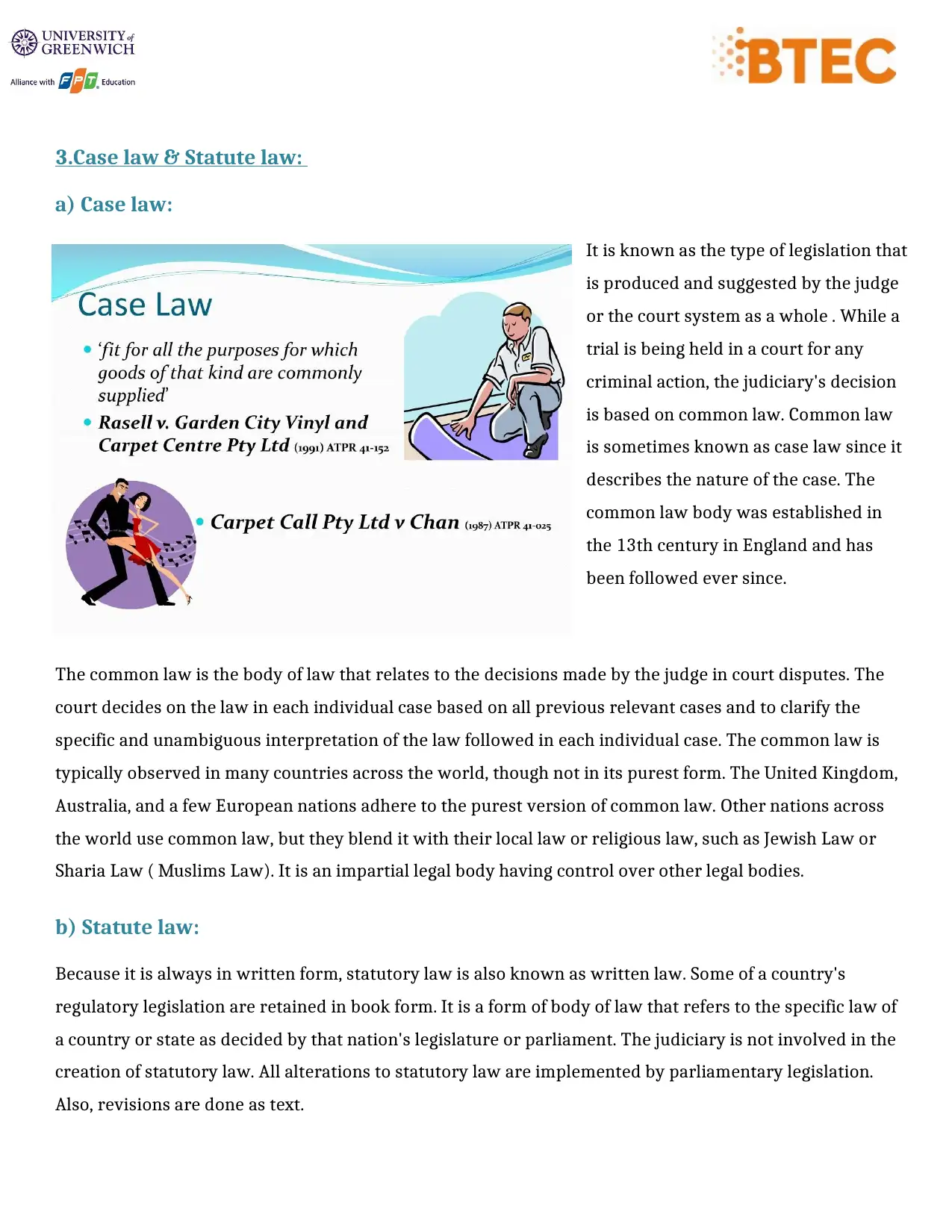
3.Case law & Statute law:
a) Case law:
It is known as the type of legislation that
is produced and suggested by the judge
or the court system as a whole . While a
trial is being held in a court for any
criminal action, the judiciary's decision
is based on common law. Common law
is sometimes known as case law since it
describes the nature of the case. The
common law body was established in
the 13th century in England and has
been followed ever since.
The common law is the body of law that relates to the decisions made by the judge in court disputes. The
court decides on the law in each individual case based on all previous relevant cases and to clarify the
specific and unambiguous interpretation of the law followed in each individual case. The common law is
typically observed in many countries across the world, though not in its purest form. The United Kingdom,
Australia, and a few European nations adhere to the purest version of common law. Other nations across
the world use common law, but they blend it with their local law or religious law, such as Jewish Law or
Sharia Law ( Muslims Law). It is an impartial legal body having control over other legal bodies.
b) Statute law:
Because it is always in written form, statutory law is also known as written law. Some of a country's
regulatory legislation are retained in book form. It is a form of body of law that refers to the specific law of
a country or state as decided by that nation's legislature or parliament. The judiciary is not involved in the
creation of statutory law. All alterations to statutory law are implemented by parliamentary legislation.
Also, revisions are done as text.
a) Case law:
It is known as the type of legislation that
is produced and suggested by the judge
or the court system as a whole . While a
trial is being held in a court for any
criminal action, the judiciary's decision
is based on common law. Common law
is sometimes known as case law since it
describes the nature of the case. The
common law body was established in
the 13th century in England and has
been followed ever since.
The common law is the body of law that relates to the decisions made by the judge in court disputes. The
court decides on the law in each individual case based on all previous relevant cases and to clarify the
specific and unambiguous interpretation of the law followed in each individual case. The common law is
typically observed in many countries across the world, though not in its purest form. The United Kingdom,
Australia, and a few European nations adhere to the purest version of common law. Other nations across
the world use common law, but they blend it with their local law or religious law, such as Jewish Law or
Sharia Law ( Muslims Law). It is an impartial legal body having control over other legal bodies.
b) Statute law:
Because it is always in written form, statutory law is also known as written law. Some of a country's
regulatory legislation are retained in book form. It is a form of body of law that refers to the specific law of
a country or state as decided by that nation's legislature or parliament. The judiciary is not involved in the
creation of statutory law. All alterations to statutory law are implemented by parliamentary legislation.
Also, revisions are done as text.
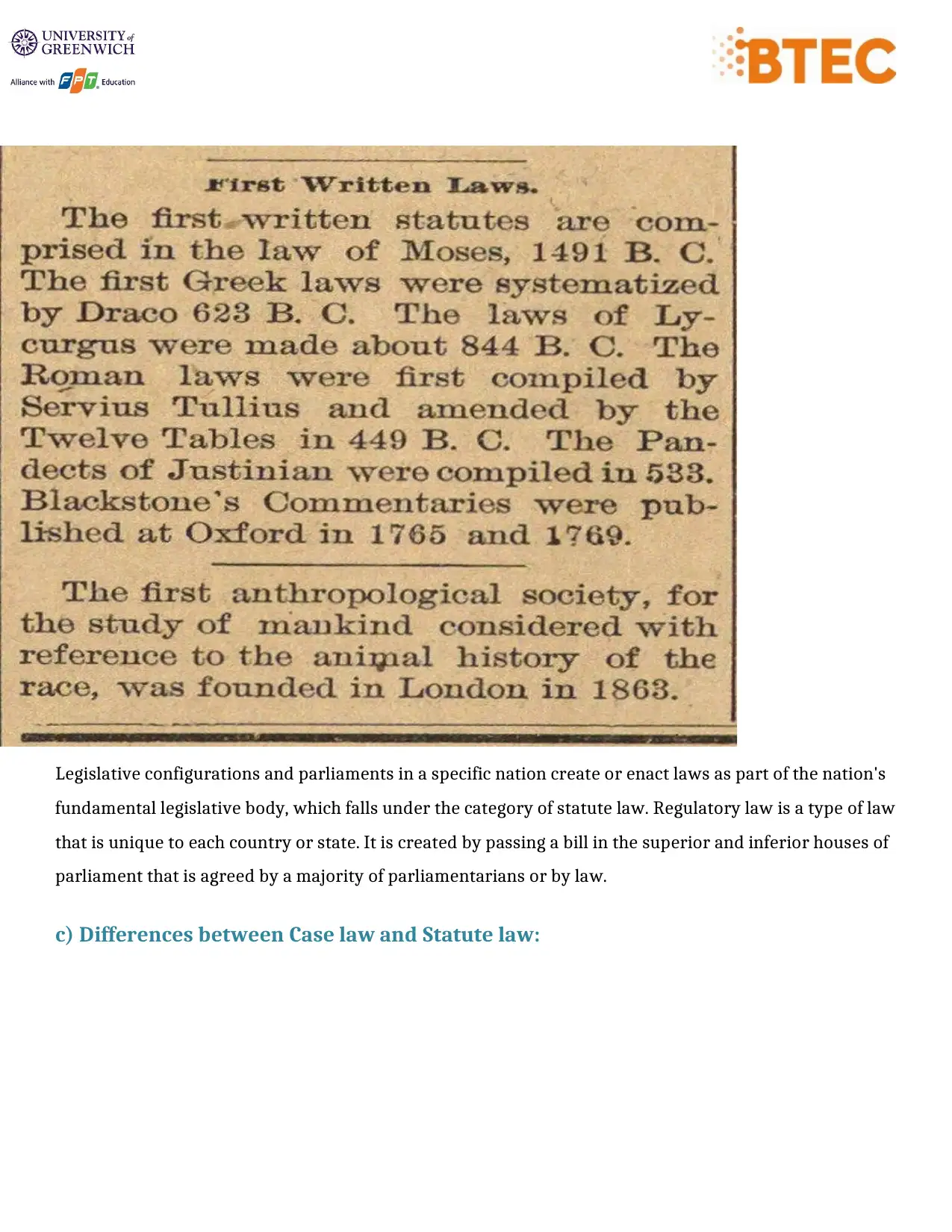
Legislative configurations and parliaments in a specific nation create or enact laws as part of the nation's
fundamental legislative body, which falls under the category of statute law. Regulatory law is a type of law
that is unique to each country or state. It is created by passing a bill in the superior and inferior houses of
parliament that is agreed by a majority of parliamentarians or by law.
c) Differences between Case law and Statute law:
fundamental legislative body, which falls under the category of statute law. Regulatory law is a type of law
that is unique to each country or state. It is created by passing a bill in the superior and inferior houses of
parliament that is agreed by a majority of parliamentarians or by law.
c) Differences between Case law and Statute law:
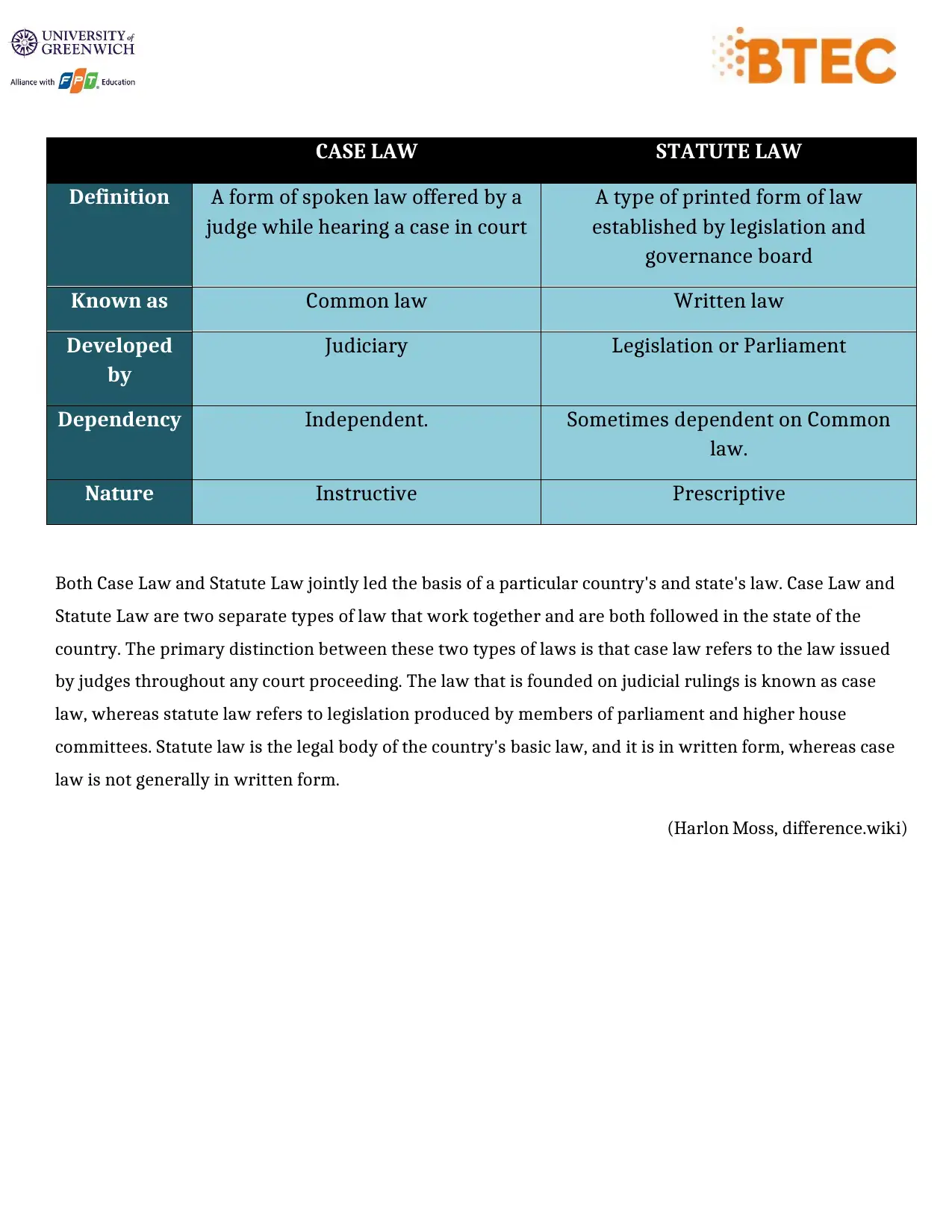
CASE LAW STATUTE LAW
Definition A form of spoken law offered by a
judge while hearing a case in court
A type of printed form of law
established by legislation and
governance board
Known as Common law Written law
Developed
by
Judiciary Legislation or Parliament
Dependency Independent. Sometimes dependent on Common
law.
Nature Instructive Prescriptive
Both Case Law and Statute Law jointly led the basis of a particular country's and state's law. Case Law and
Statute Law are two separate types of law that work together and are both followed in the state of the
country. The primary distinction between these two types of laws is that case law refers to the law issued
by judges throughout any court proceeding. The law that is founded on judicial rulings is known as case
law, whereas statute law refers to legislation produced by members of parliament and higher house
committees. Statute law is the legal body of the country's basic law, and it is in written form, whereas case
law is not generally in written form.
(Harlon Moss, difference.wiki)
Definition A form of spoken law offered by a
judge while hearing a case in court
A type of printed form of law
established by legislation and
governance board
Known as Common law Written law
Developed
by
Judiciary Legislation or Parliament
Dependency Independent. Sometimes dependent on Common
law.
Nature Instructive Prescriptive
Both Case Law and Statute Law jointly led the basis of a particular country's and state's law. Case Law and
Statute Law are two separate types of law that work together and are both followed in the state of the
country. The primary distinction between these two types of laws is that case law refers to the law issued
by judges throughout any court proceeding. The law that is founded on judicial rulings is known as case
law, whereas statute law refers to legislation produced by members of parliament and higher house
committees. Statute law is the legal body of the country's basic law, and it is in written form, whereas case
law is not generally in written form.
(Harlon Moss, difference.wiki)
Paraphrase This Document
Need a fresh take? Get an instant paraphrase of this document with our AI Paraphraser
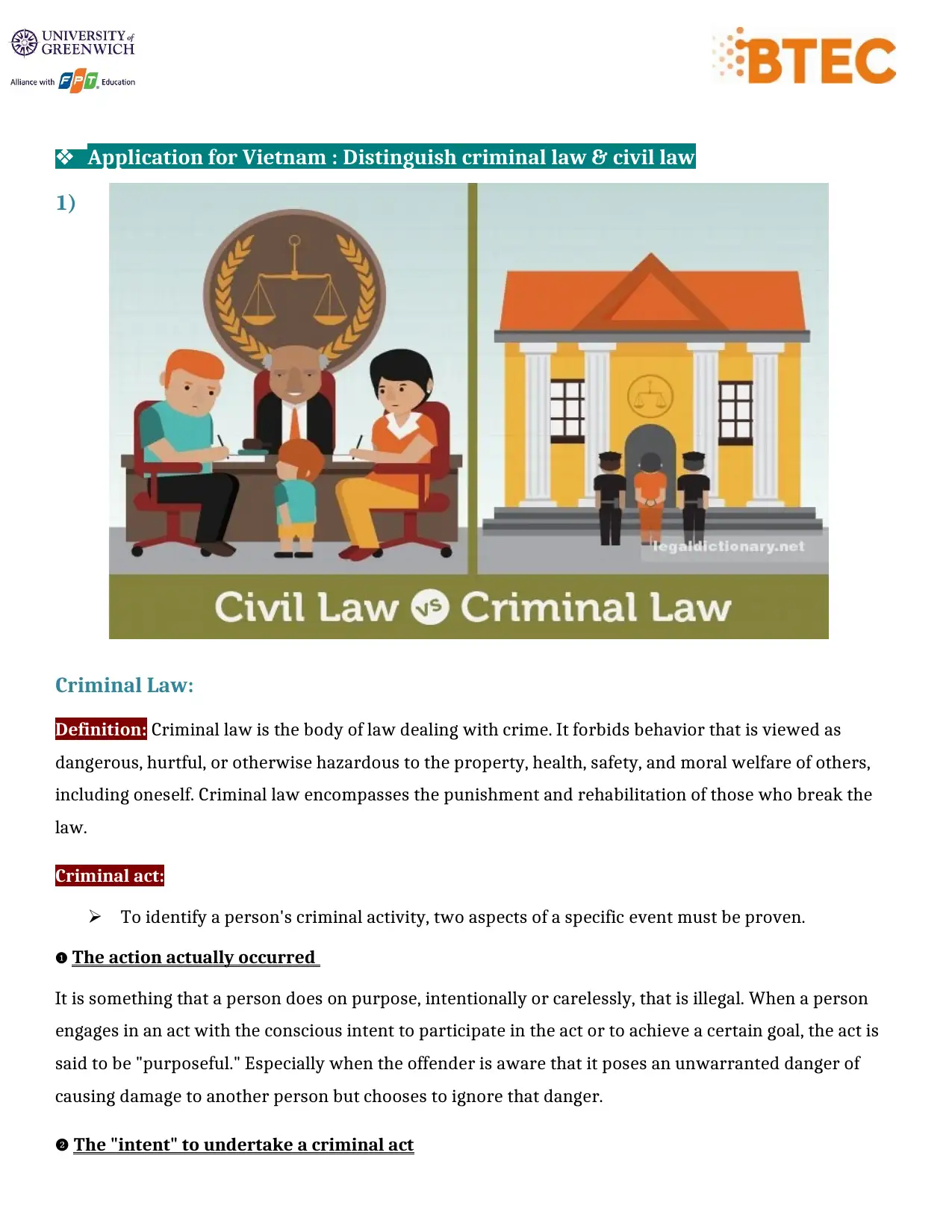
Application for Vietnam : Distinguish criminal law & civil law
1)
Criminal Law:
Definition: Criminal law is the body of law dealing with crime. It forbids behavior that is viewed as
dangerous, hurtful, or otherwise hazardous to the property, health, safety, and moral welfare of others,
including oneself. Criminal law encompasses the punishment and rehabilitation of those who break the
law.
Criminal act:
To identify a person's criminal activity, two aspects of a specific event must be proven.
❶ The action actually occurred
It is something that a person does on purpose, intentionally or carelessly, that is illegal. When a person
engages in an act with the conscious intent to participate in the act or to achieve a certain goal, the act is
said to be "purposeful." Especially when the offender is aware that it poses an unwarranted danger of
causing damage to another person but chooses to ignore that danger.
❷ The "intent" to undertake a criminal act
1)
Criminal Law:
Definition: Criminal law is the body of law dealing with crime. It forbids behavior that is viewed as
dangerous, hurtful, or otherwise hazardous to the property, health, safety, and moral welfare of others,
including oneself. Criminal law encompasses the punishment and rehabilitation of those who break the
law.
Criminal act:
To identify a person's criminal activity, two aspects of a specific event must be proven.
❶ The action actually occurred
It is something that a person does on purpose, intentionally or carelessly, that is illegal. When a person
engages in an act with the conscious intent to participate in the act or to achieve a certain goal, the act is
said to be "purposeful." Especially when the offender is aware that it poses an unwarranted danger of
causing damage to another person but chooses to ignore that danger.
❷ The "intent" to undertake a criminal act
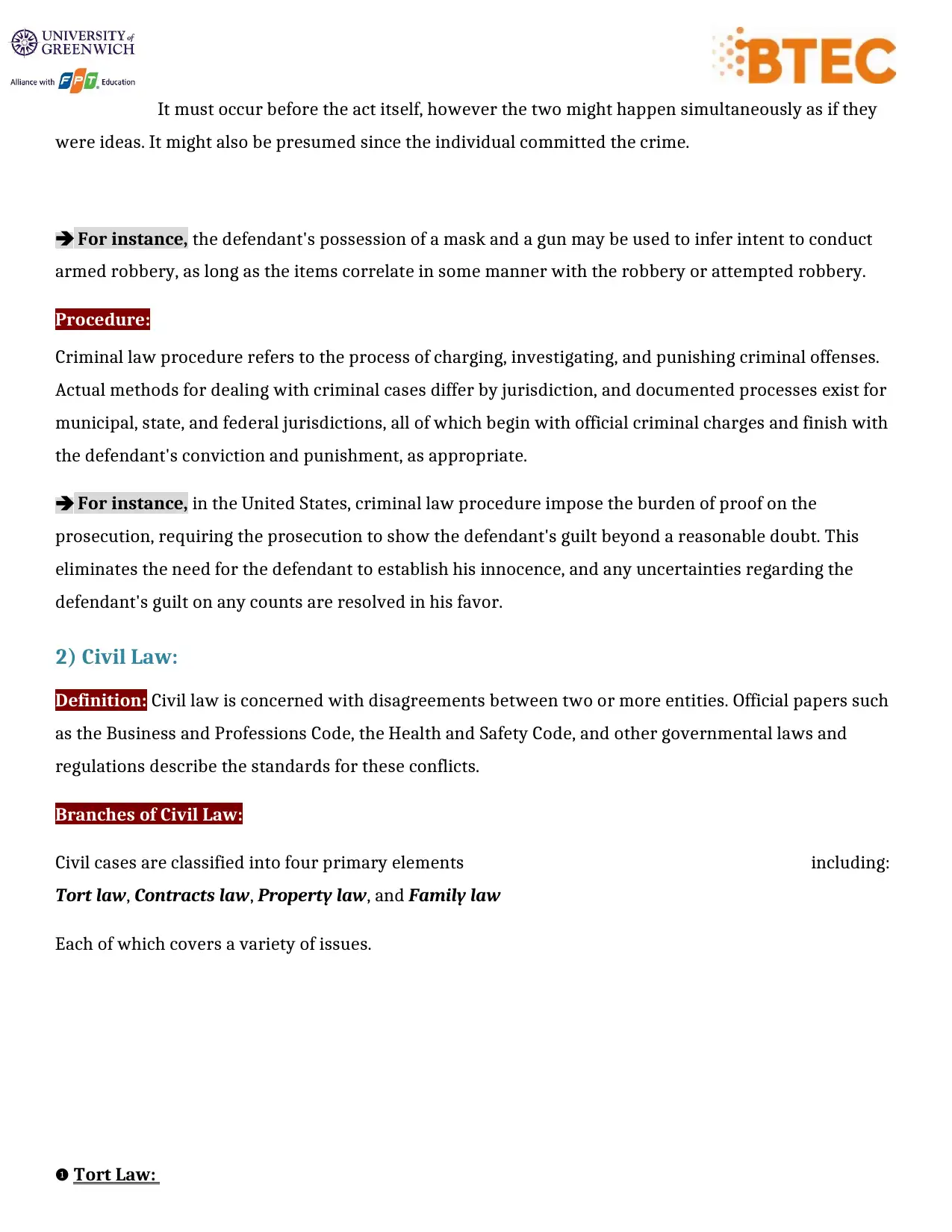
It must occur before the act itself, however the two might happen simultaneously as if they
were ideas. It might also be presumed since the individual committed the crime.
è For instance, the defendant's possession of a mask and a gun may be used to infer intent to conduct
armed robbery, as long as the items correlate in some manner with the robbery or attempted robbery.
Procedure:
Criminal law procedure refers to the process of charging, investigating, and punishing criminal offenses.
Actual methods for dealing with criminal cases differ by jurisdiction, and documented processes exist for
municipal, state, and federal jurisdictions, all of which begin with official criminal charges and finish with
the defendant's conviction and punishment, as appropriate.
è For instance, in the United States, criminal law procedure impose the burden of proof on the
prosecution, requiring the prosecution to show the defendant's guilt beyond a reasonable doubt. This
eliminates the need for the defendant to establish his innocence, and any uncertainties regarding the
defendant's guilt on any counts are resolved in his favor.
2) Civil Law:
Definition: Civil law is concerned with disagreements between two or more entities. Official papers such
as the Business and Professions Code, the Health and Safety Code, and other governmental laws and
regulations describe the standards for these conflicts.
Branches of Civil Law:
Civil cases are classified into four primary elements including:
Tort law, Contracts law, Property law, and Family law
Each of which covers a variety of issues.
❶ Tort Law:
were ideas. It might also be presumed since the individual committed the crime.
è For instance, the defendant's possession of a mask and a gun may be used to infer intent to conduct
armed robbery, as long as the items correlate in some manner with the robbery or attempted robbery.
Procedure:
Criminal law procedure refers to the process of charging, investigating, and punishing criminal offenses.
Actual methods for dealing with criminal cases differ by jurisdiction, and documented processes exist for
municipal, state, and federal jurisdictions, all of which begin with official criminal charges and finish with
the defendant's conviction and punishment, as appropriate.
è For instance, in the United States, criminal law procedure impose the burden of proof on the
prosecution, requiring the prosecution to show the defendant's guilt beyond a reasonable doubt. This
eliminates the need for the defendant to establish his innocence, and any uncertainties regarding the
defendant's guilt on any counts are resolved in his favor.
2) Civil Law:
Definition: Civil law is concerned with disagreements between two or more entities. Official papers such
as the Business and Professions Code, the Health and Safety Code, and other governmental laws and
regulations describe the standards for these conflicts.
Branches of Civil Law:
Civil cases are classified into four primary elements including:
Tort law, Contracts law, Property law, and Family law
Each of which covers a variety of issues.
❶ Tort Law:
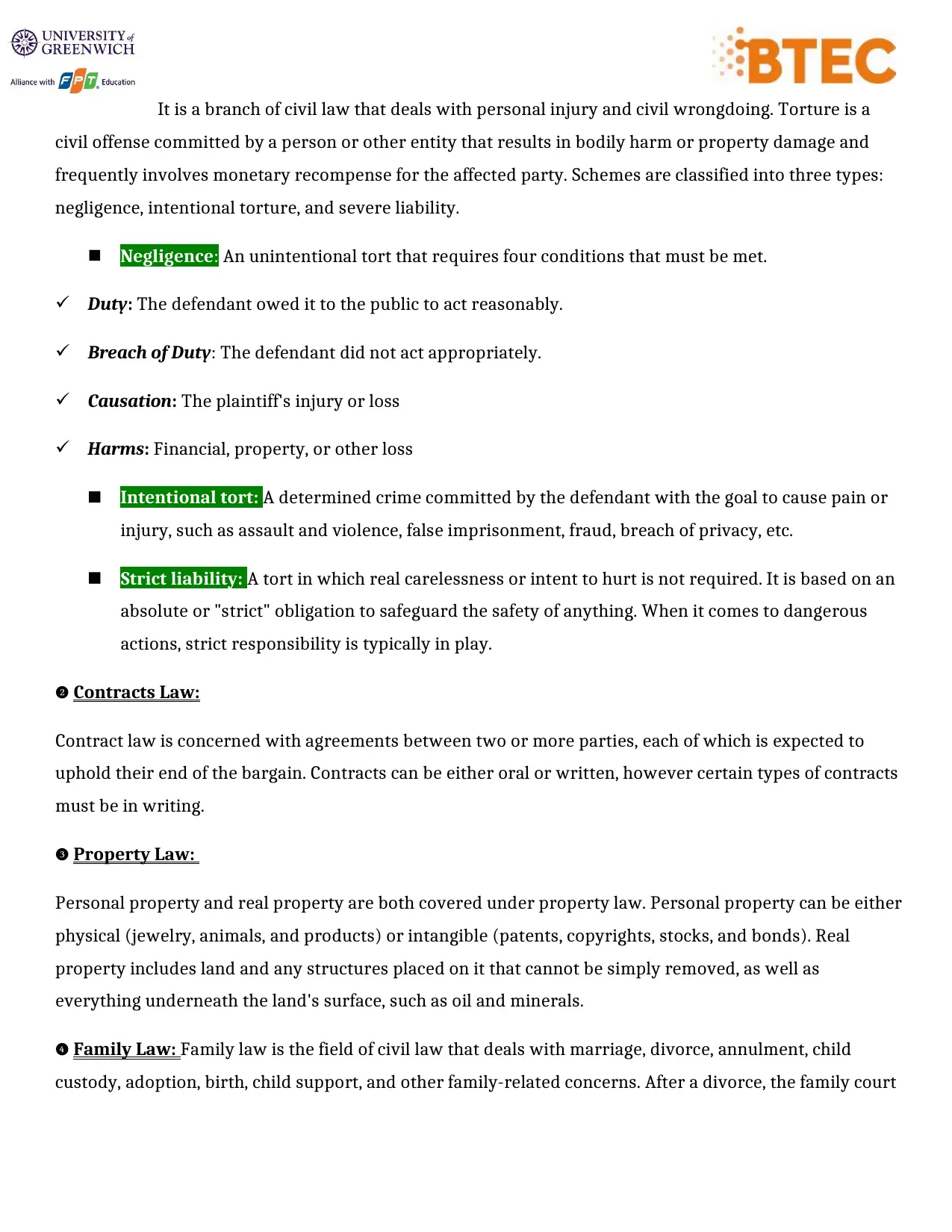
It is a branch of civil law that deals with personal injury and civil wrongdoing. Torture is a
civil offense committed by a person or other entity that results in bodily harm or property damage and
frequently involves monetary recompense for the affected party. Schemes are classified into three types:
negligence, intentional torture, and severe liability.
Negligence: An unintentional tort that requires four conditions that must be met.
Duty: The defendant owed it to the public to act reasonably.
Breach of Duty: The defendant did not act appropriately.
Causation: The plaintiff's injury or loss
Harms: Financial, property, or other loss
Intentional tort: A determined crime committed by the defendant with the goal to cause pain or
injury, such as assault and violence, false imprisonment, fraud, breach of privacy, etc.
Strict liability: A tort in which real carelessness or intent to hurt is not required. It is based on an
absolute or "strict" obligation to safeguard the safety of anything. When it comes to dangerous
actions, strict responsibility is typically in play.
❷ Contracts Law:
Contract law is concerned with agreements between two or more parties, each of which is expected to
uphold their end of the bargain. Contracts can be either oral or written, however certain types of contracts
must be in writing.
❸ Property Law:
Personal property and real property are both covered under property law. Personal property can be either
physical (jewelry, animals, and products) or intangible (patents, copyrights, stocks, and bonds). Real
property includes land and any structures placed on it that cannot be simply removed, as well as
everything underneath the land's surface, such as oil and minerals.
❹ Family Law: Family law is the field of civil law that deals with marriage, divorce, annulment, child
custody, adoption, birth, child support, and other family-related concerns. After a divorce, the family court
civil offense committed by a person or other entity that results in bodily harm or property damage and
frequently involves monetary recompense for the affected party. Schemes are classified into three types:
negligence, intentional torture, and severe liability.
Negligence: An unintentional tort that requires four conditions that must be met.
Duty: The defendant owed it to the public to act reasonably.
Breach of Duty: The defendant did not act appropriately.
Causation: The plaintiff's injury or loss
Harms: Financial, property, or other loss
Intentional tort: A determined crime committed by the defendant with the goal to cause pain or
injury, such as assault and violence, false imprisonment, fraud, breach of privacy, etc.
Strict liability: A tort in which real carelessness or intent to hurt is not required. It is based on an
absolute or "strict" obligation to safeguard the safety of anything. When it comes to dangerous
actions, strict responsibility is typically in play.
❷ Contracts Law:
Contract law is concerned with agreements between two or more parties, each of which is expected to
uphold their end of the bargain. Contracts can be either oral or written, however certain types of contracts
must be in writing.
❸ Property Law:
Personal property and real property are both covered under property law. Personal property can be either
physical (jewelry, animals, and products) or intangible (patents, copyrights, stocks, and bonds). Real
property includes land and any structures placed on it that cannot be simply removed, as well as
everything underneath the land's surface, such as oil and minerals.
❹ Family Law: Family law is the field of civil law that deals with marriage, divorce, annulment, child
custody, adoption, birth, child support, and other family-related concerns. After a divorce, the family court
Secure Best Marks with AI Grader
Need help grading? Try our AI Grader for instant feedback on your assignments.
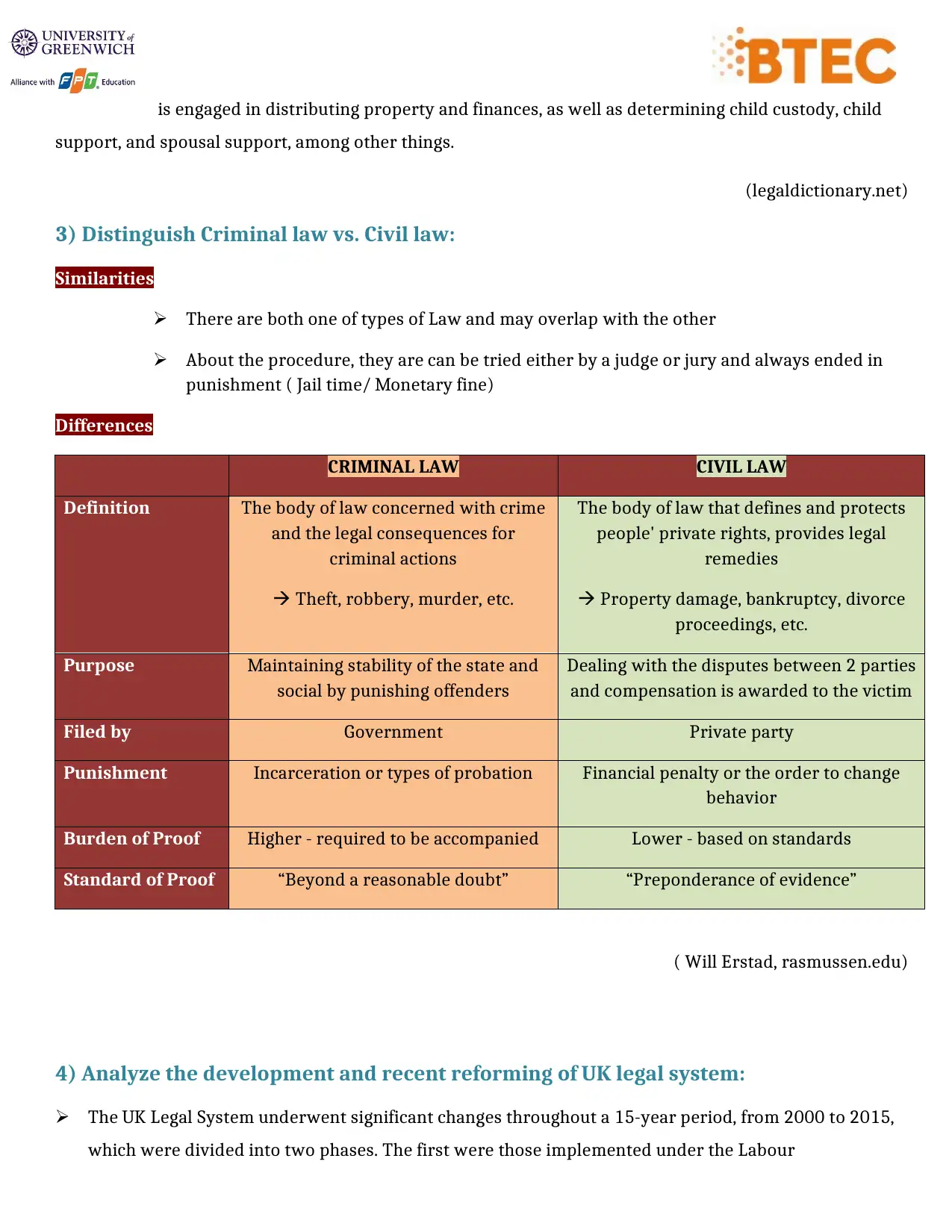
is engaged in distributing property and finances, as well as determining child custody, child
support, and spousal support, among other things.
(legaldictionary.net)
3) Distinguish Criminal law vs. Civil law:
Similarities
There are both one of types of Law and may overlap with the other
About the procedure, they are can be tried either by a judge or jury and always ended in
punishment ( Jail time/ Monetary fine)
Differences
CRIMINAL LAW CIVIL LAW
Definition The body of law concerned with crime
and the legal consequences for
criminal actions
à Theft, robbery, murder, etc.
The body of law that defines and protects
people' private rights, provides legal
remedies
à Property damage, bankruptcy, divorce
proceedings, etc.
Purpose Maintaining stability of the state and
social by punishing offenders
Dealing with the disputes between 2 parties
and compensation is awarded to the victim
Filed by Government Private party
Punishment Incarceration or types of probation Financial penalty or the order to change
behavior
Burden of Proof Higher - required to be accompanied Lower - based on standards
Standard of Proof “Beyond a reasonable doubt” “Preponderance of evidence”
( Will Erstad, rasmussen.edu)
4) Analyze the development and recent reforming of UK legal system:
The UK Legal System underwent significant changes throughout a 15-year period, from 2000 to 2015,
which were divided into two phases. The first were those implemented under the Labour
support, and spousal support, among other things.
(legaldictionary.net)
3) Distinguish Criminal law vs. Civil law:
Similarities
There are both one of types of Law and may overlap with the other
About the procedure, they are can be tried either by a judge or jury and always ended in
punishment ( Jail time/ Monetary fine)
Differences
CRIMINAL LAW CIVIL LAW
Definition The body of law concerned with crime
and the legal consequences for
criminal actions
à Theft, robbery, murder, etc.
The body of law that defines and protects
people' private rights, provides legal
remedies
à Property damage, bankruptcy, divorce
proceedings, etc.
Purpose Maintaining stability of the state and
social by punishing offenders
Dealing with the disputes between 2 parties
and compensation is awarded to the victim
Filed by Government Private party
Punishment Incarceration or types of probation Financial penalty or the order to change
behavior
Burden of Proof Higher - required to be accompanied Lower - based on standards
Standard of Proof “Beyond a reasonable doubt” “Preponderance of evidence”
( Will Erstad, rasmussen.edu)
4) Analyze the development and recent reforming of UK legal system:
The UK Legal System underwent significant changes throughout a 15-year period, from 2000 to 2015,
which were divided into two phases. The first were those implemented under the Labour
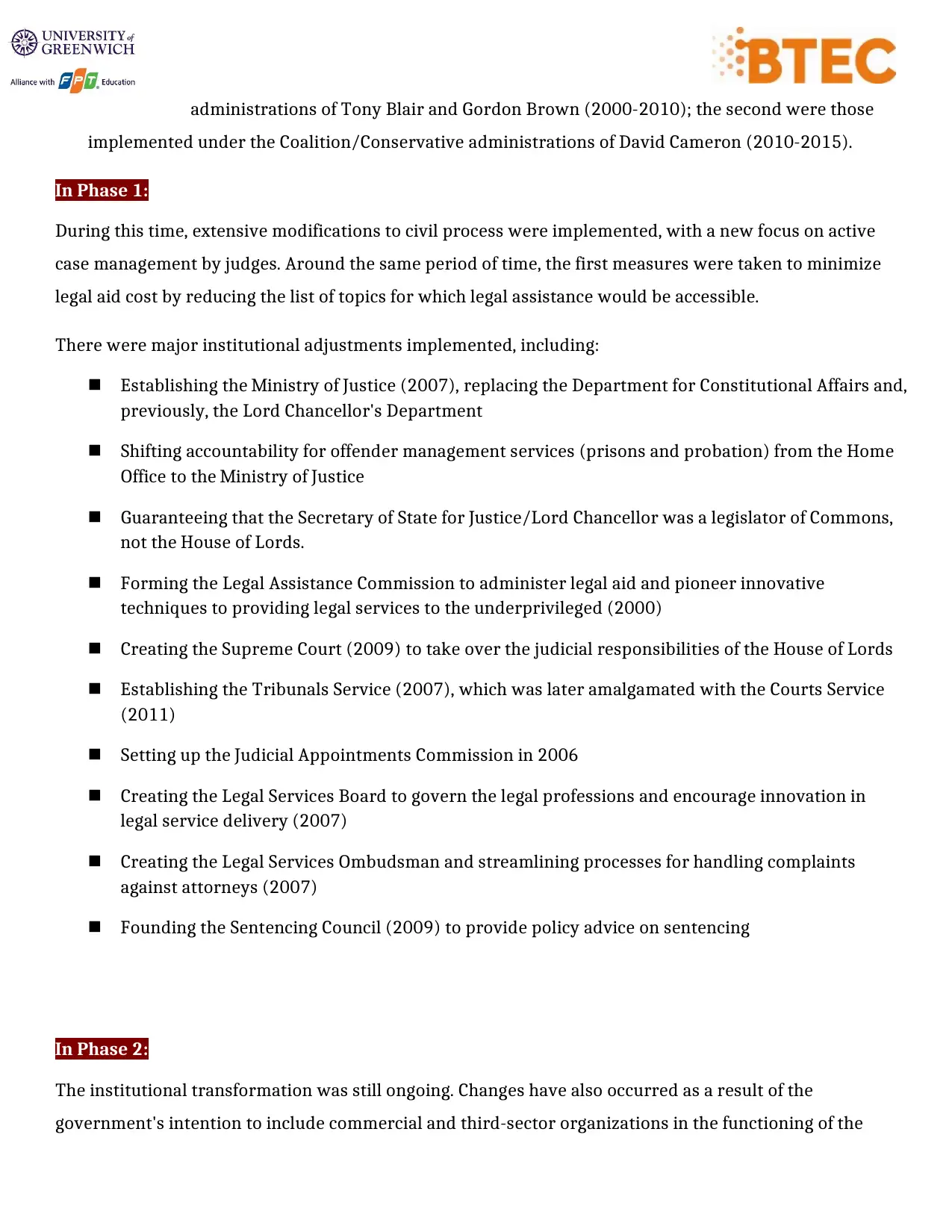
administrations of Tony Blair and Gordon Brown (2000-2010); the second were those
implemented under the Coalition/Conservative administrations of David Cameron (2010-2015).
In Phase 1:
During this time, extensive modifications to civil process were implemented, with a new focus on active
case management by judges. Around the same period of time, the first measures were taken to minimize
legal aid cost by reducing the list of topics for which legal assistance would be accessible.
There were major institutional adjustments implemented, including:
Establishing the Ministry of Justice (2007), replacing the Department for Constitutional Affairs and,
previously, the Lord Chancellor's Department
Shifting accountability for offender management services (prisons and probation) from the Home
Office to the Ministry of Justice
Guaranteeing that the Secretary of State for Justice/Lord Chancellor was a legislator of Commons,
not the House of Lords.
Forming the Legal Assistance Commission to administer legal aid and pioneer innovative
techniques to providing legal services to the underprivileged (2000)
Creating the Supreme Court (2009) to take over the judicial responsibilities of the House of Lords
Establishing the Tribunals Service (2007), which was later amalgamated with the Courts Service
(2011)
Setting up the Judicial Appointments Commission in 2006
Creating the Legal Services Board to govern the legal professions and encourage innovation in
legal service delivery (2007)
Creating the Legal Services Ombudsman and streamlining processes for handling complaints
against attorneys (2007)
Founding the Sentencing Council (2009) to provide policy advice on sentencing
In Phase 2:
The institutional transformation was still ongoing. Changes have also occurred as a result of the
government's intention to include commercial and third-sector organizations in the functioning of the
implemented under the Coalition/Conservative administrations of David Cameron (2010-2015).
In Phase 1:
During this time, extensive modifications to civil process were implemented, with a new focus on active
case management by judges. Around the same period of time, the first measures were taken to minimize
legal aid cost by reducing the list of topics for which legal assistance would be accessible.
There were major institutional adjustments implemented, including:
Establishing the Ministry of Justice (2007), replacing the Department for Constitutional Affairs and,
previously, the Lord Chancellor's Department
Shifting accountability for offender management services (prisons and probation) from the Home
Office to the Ministry of Justice
Guaranteeing that the Secretary of State for Justice/Lord Chancellor was a legislator of Commons,
not the House of Lords.
Forming the Legal Assistance Commission to administer legal aid and pioneer innovative
techniques to providing legal services to the underprivileged (2000)
Creating the Supreme Court (2009) to take over the judicial responsibilities of the House of Lords
Establishing the Tribunals Service (2007), which was later amalgamated with the Courts Service
(2011)
Setting up the Judicial Appointments Commission in 2006
Creating the Legal Services Board to govern the legal professions and encourage innovation in
legal service delivery (2007)
Creating the Legal Services Ombudsman and streamlining processes for handling complaints
against attorneys (2007)
Founding the Sentencing Council (2009) to provide policy advice on sentencing
In Phase 2:
The institutional transformation was still ongoing. Changes have also occurred as a result of the
government's intention to include commercial and third-sector organizations in the functioning of the
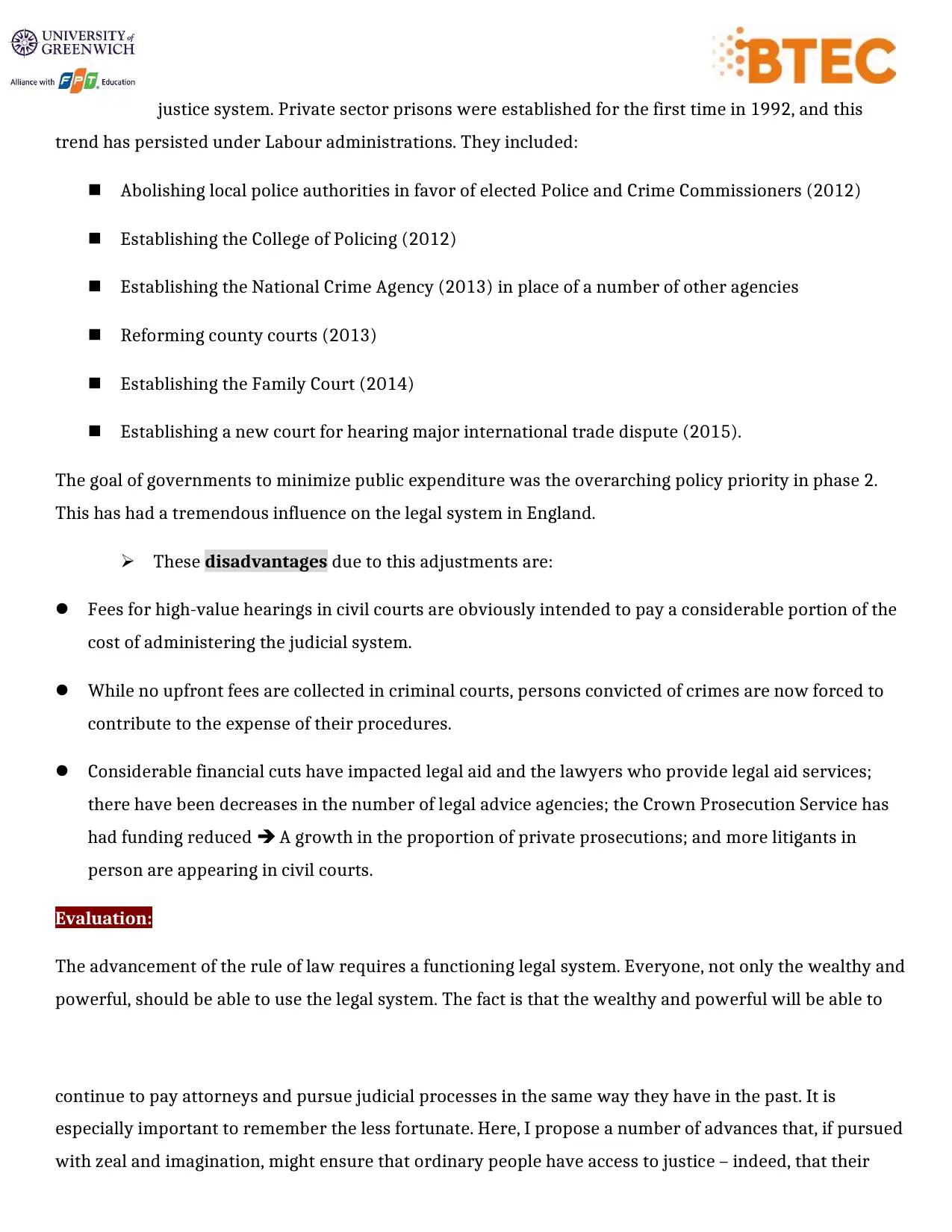
justice system. Private sector prisons were established for the first time in 1992, and this
trend has persisted under Labour administrations. They included:
Abolishing local police authorities in favor of elected Police and Crime Commissioners (2012)
Establishing the College of Policing (2012)
Establishing the National Crime Agency (2013) in place of a number of other agencies
Reforming county courts (2013)
Establishing the Family Court (2014)
Establishing a new court for hearing major international trade dispute (2015).
The goal of governments to minimize public expenditure was the overarching policy priority in phase 2.
This has had a tremendous influence on the legal system in England.
These disadvantages due to this adjustments are:
Fees for high-value hearings in civil courts are obviously intended to pay a considerable portion of the
cost of administering the judicial system.
While no upfront fees are collected in criminal courts, persons convicted of crimes are now forced to
contribute to the expense of their procedures.
Considerable financial cuts have impacted legal aid and the lawyers who provide legal aid services;
there have been decreases in the number of legal advice agencies; the Crown Prosecution Service has
had funding reduced è A growth in the proportion of private prosecutions; and more litigants in
person are appearing in civil courts.
Evaluation:
The advancement of the rule of law requires a functioning legal system. Everyone, not only the wealthy and
powerful, should be able to use the legal system. The fact is that the wealthy and powerful will be able to
continue to pay attorneys and pursue judicial processes in the same way they have in the past. It is
especially important to remember the less fortunate. Here, I propose a number of advances that, if pursued
with zeal and imagination, might ensure that ordinary people have access to justice – indeed, that their
trend has persisted under Labour administrations. They included:
Abolishing local police authorities in favor of elected Police and Crime Commissioners (2012)
Establishing the College of Policing (2012)
Establishing the National Crime Agency (2013) in place of a number of other agencies
Reforming county courts (2013)
Establishing the Family Court (2014)
Establishing a new court for hearing major international trade dispute (2015).
The goal of governments to minimize public expenditure was the overarching policy priority in phase 2.
This has had a tremendous influence on the legal system in England.
These disadvantages due to this adjustments are:
Fees for high-value hearings in civil courts are obviously intended to pay a considerable portion of the
cost of administering the judicial system.
While no upfront fees are collected in criminal courts, persons convicted of crimes are now forced to
contribute to the expense of their procedures.
Considerable financial cuts have impacted legal aid and the lawyers who provide legal aid services;
there have been decreases in the number of legal advice agencies; the Crown Prosecution Service has
had funding reduced è A growth in the proportion of private prosecutions; and more litigants in
person are appearing in civil courts.
Evaluation:
The advancement of the rule of law requires a functioning legal system. Everyone, not only the wealthy and
powerful, should be able to use the legal system. The fact is that the wealthy and powerful will be able to
continue to pay attorneys and pursue judicial processes in the same way they have in the past. It is
especially important to remember the less fortunate. Here, I propose a number of advances that, if pursued
with zeal and imagination, might ensure that ordinary people have access to justice – indeed, that their
Paraphrase This Document
Need a fresh take? Get an instant paraphrase of this document with our AI Paraphraser
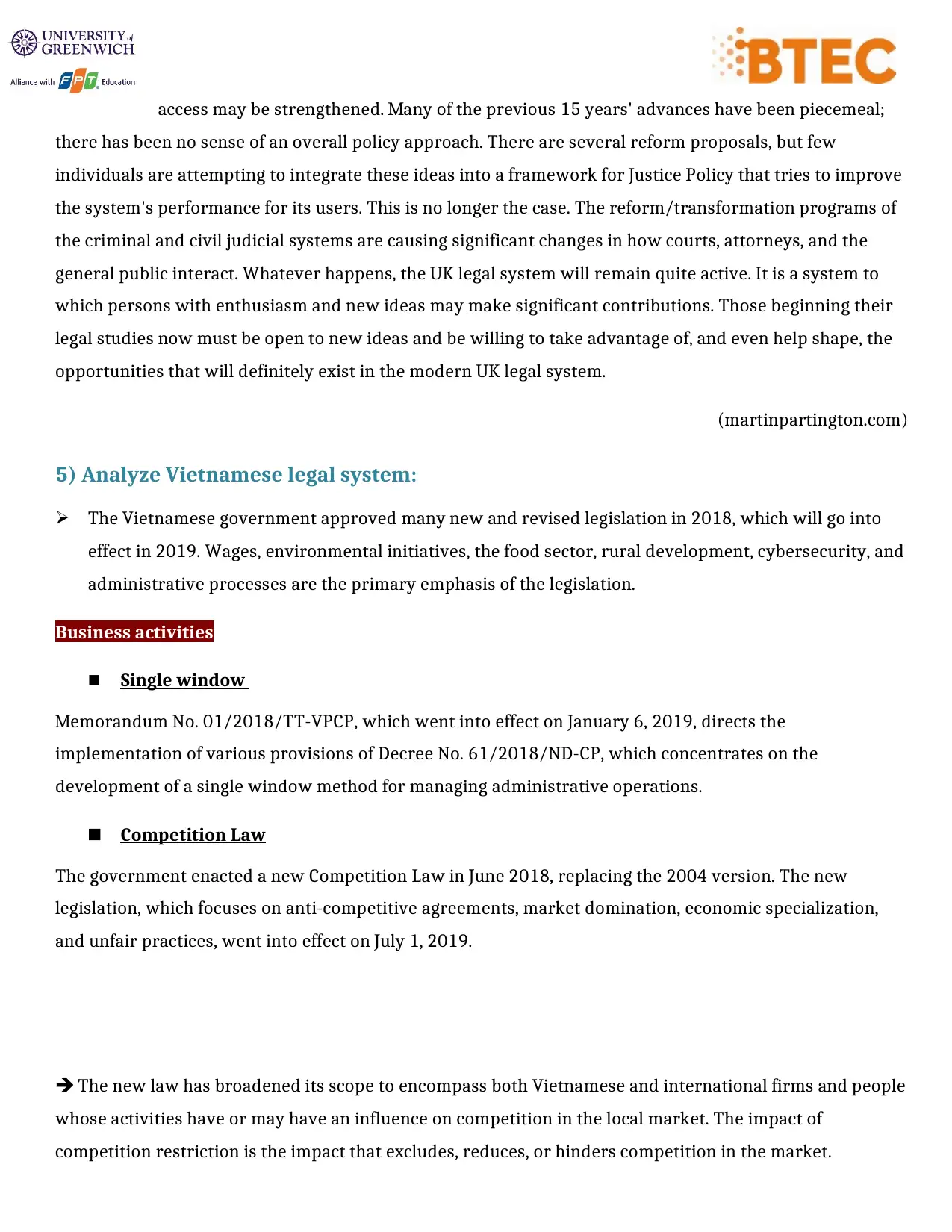
access may be strengthened. Many of the previous 15 years' advances have been piecemeal;
there has been no sense of an overall policy approach. There are several reform proposals, but few
individuals are attempting to integrate these ideas into a framework for Justice Policy that tries to improve
the system's performance for its users. This is no longer the case. The reform/transformation programs of
the criminal and civil judicial systems are causing significant changes in how courts, attorneys, and the
general public interact. Whatever happens, the UK legal system will remain quite active. It is a system to
which persons with enthusiasm and new ideas may make significant contributions. Those beginning their
legal studies now must be open to new ideas and be willing to take advantage of, and even help shape, the
opportunities that will definitely exist in the modern UK legal system.
(martinpartington.com)
5) Analyze Vietnamese legal system:
The Vietnamese government approved many new and revised legislation in 2018, which will go into
effect in 2019. Wages, environmental initiatives, the food sector, rural development, cybersecurity, and
administrative processes are the primary emphasis of the legislation.
Business activities
Single window
Memorandum No. 01/2018/TT-VPCP, which went into effect on January 6, 2019, directs the
implementation of various provisions of Decree No. 61/2018/ND-CP, which concentrates on the
development of a single window method for managing administrative operations.
Competition Law
The government enacted a new Competition Law in June 2018, replacing the 2004 version. The new
legislation, which focuses on anti-competitive agreements, market domination, economic specialization,
and unfair practices, went into effect on July 1, 2019.
è The new law has broadened its scope to encompass both Vietnamese and international firms and people
whose activities have or may have an influence on competition in the local market. The impact of
competition restriction is the impact that excludes, reduces, or hinders competition in the market.
there has been no sense of an overall policy approach. There are several reform proposals, but few
individuals are attempting to integrate these ideas into a framework for Justice Policy that tries to improve
the system's performance for its users. This is no longer the case. The reform/transformation programs of
the criminal and civil judicial systems are causing significant changes in how courts, attorneys, and the
general public interact. Whatever happens, the UK legal system will remain quite active. It is a system to
which persons with enthusiasm and new ideas may make significant contributions. Those beginning their
legal studies now must be open to new ideas and be willing to take advantage of, and even help shape, the
opportunities that will definitely exist in the modern UK legal system.
(martinpartington.com)
5) Analyze Vietnamese legal system:
The Vietnamese government approved many new and revised legislation in 2018, which will go into
effect in 2019. Wages, environmental initiatives, the food sector, rural development, cybersecurity, and
administrative processes are the primary emphasis of the legislation.
Business activities
Single window
Memorandum No. 01/2018/TT-VPCP, which went into effect on January 6, 2019, directs the
implementation of various provisions of Decree No. 61/2018/ND-CP, which concentrates on the
development of a single window method for managing administrative operations.
Competition Law
The government enacted a new Competition Law in June 2018, replacing the 2004 version. The new
legislation, which focuses on anti-competitive agreements, market domination, economic specialization,
and unfair practices, went into effect on July 1, 2019.
è The new law has broadened its scope to encompass both Vietnamese and international firms and people
whose activities have or may have an influence on competition in the local market. The impact of
competition restriction is the impact that excludes, reduces, or hinders competition in the market.
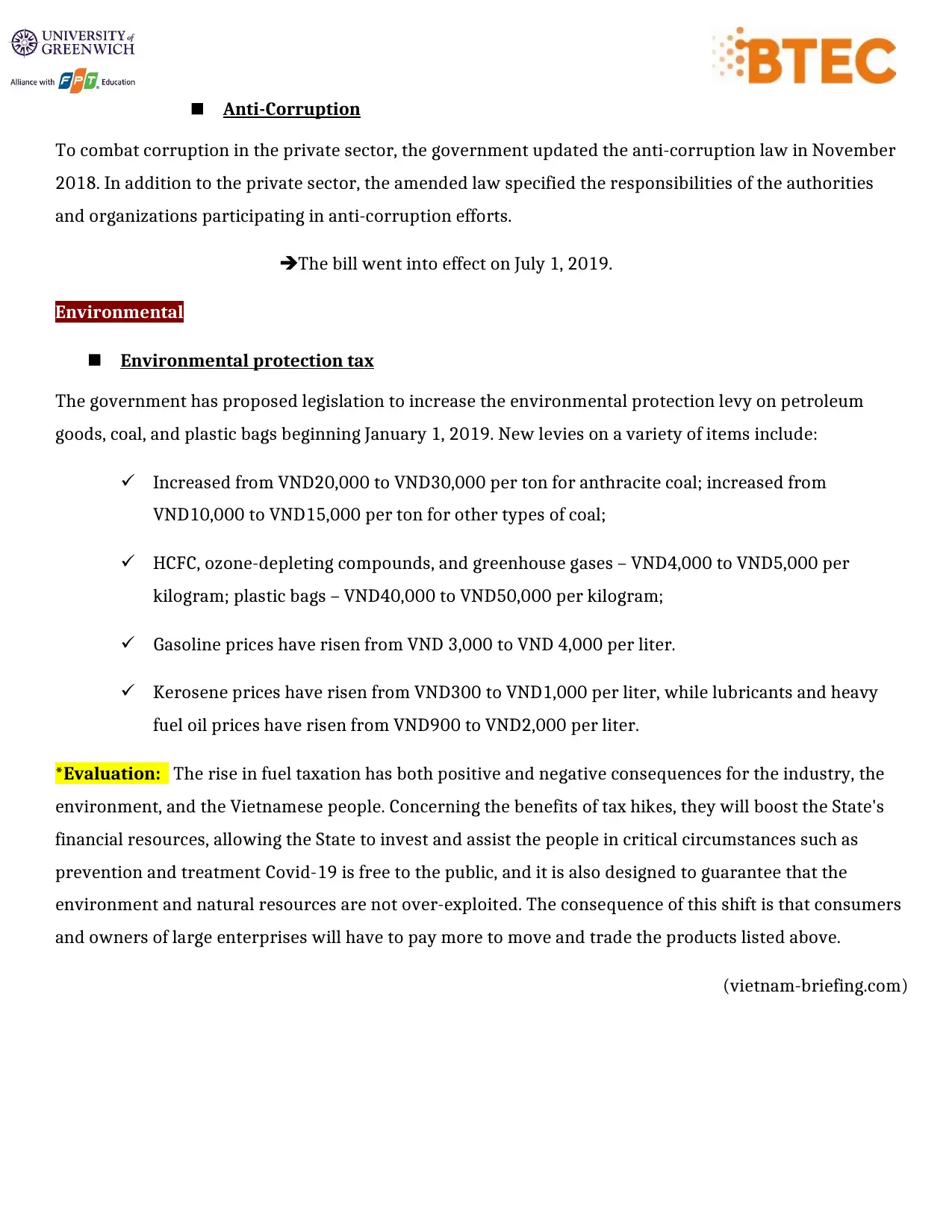
Anti-Corruption
To combat corruption in the private sector, the government updated the anti-corruption law in November
2018. In addition to the private sector, the amended law specified the responsibilities of the authorities
and organizations participating in anti-corruption efforts.
èThe bill went into effect on July 1, 2019.
Environmental
Environmental protection tax
The government has proposed legislation to increase the environmental protection levy on petroleum
goods, coal, and plastic bags beginning January 1, 2019. New levies on a variety of items include:
Increased from VND20,000 to VND30,000 per ton for anthracite coal; increased from
VND10,000 to VND15,000 per ton for other types of coal;
HCFC, ozone-depleting compounds, and greenhouse gases – VND4,000 to VND5,000 per
kilogram; plastic bags – VND40,000 to VND50,000 per kilogram;
Gasoline prices have risen from VND 3,000 to VND 4,000 per liter.
Kerosene prices have risen from VND300 to VND1,000 per liter, while lubricants and heavy
fuel oil prices have risen from VND900 to VND2,000 per liter.
*Evaluation: The rise in fuel taxation has both positive and negative consequences for the industry, the
environment, and the Vietnamese people. Concerning the benefits of tax hikes, they will boost the State's
financial resources, allowing the State to invest and assist the people in critical circumstances such as
prevention and treatment Covid-19 is free to the public, and it is also designed to guarantee that the
environment and natural resources are not over-exploited. The consequence of this shift is that consumers
and owners of large enterprises will have to pay more to move and trade the products listed above.
(vietnam-briefing.com)
To combat corruption in the private sector, the government updated the anti-corruption law in November
2018. In addition to the private sector, the amended law specified the responsibilities of the authorities
and organizations participating in anti-corruption efforts.
èThe bill went into effect on July 1, 2019.
Environmental
Environmental protection tax
The government has proposed legislation to increase the environmental protection levy on petroleum
goods, coal, and plastic bags beginning January 1, 2019. New levies on a variety of items include:
Increased from VND20,000 to VND30,000 per ton for anthracite coal; increased from
VND10,000 to VND15,000 per ton for other types of coal;
HCFC, ozone-depleting compounds, and greenhouse gases – VND4,000 to VND5,000 per
kilogram; plastic bags – VND40,000 to VND50,000 per kilogram;
Gasoline prices have risen from VND 3,000 to VND 4,000 per liter.
Kerosene prices have risen from VND300 to VND1,000 per liter, while lubricants and heavy
fuel oil prices have risen from VND900 to VND2,000 per liter.
*Evaluation: The rise in fuel taxation has both positive and negative consequences for the industry, the
environment, and the Vietnamese people. Concerning the benefits of tax hikes, they will boost the State's
financial resources, allowing the State to invest and assist the people in critical circumstances such as
prevention and treatment Covid-19 is free to the public, and it is also designed to guarantee that the
environment and natural resources are not over-exploited. The consequence of this shift is that consumers
and owners of large enterprises will have to pay more to move and trade the products listed above.
(vietnam-briefing.com)
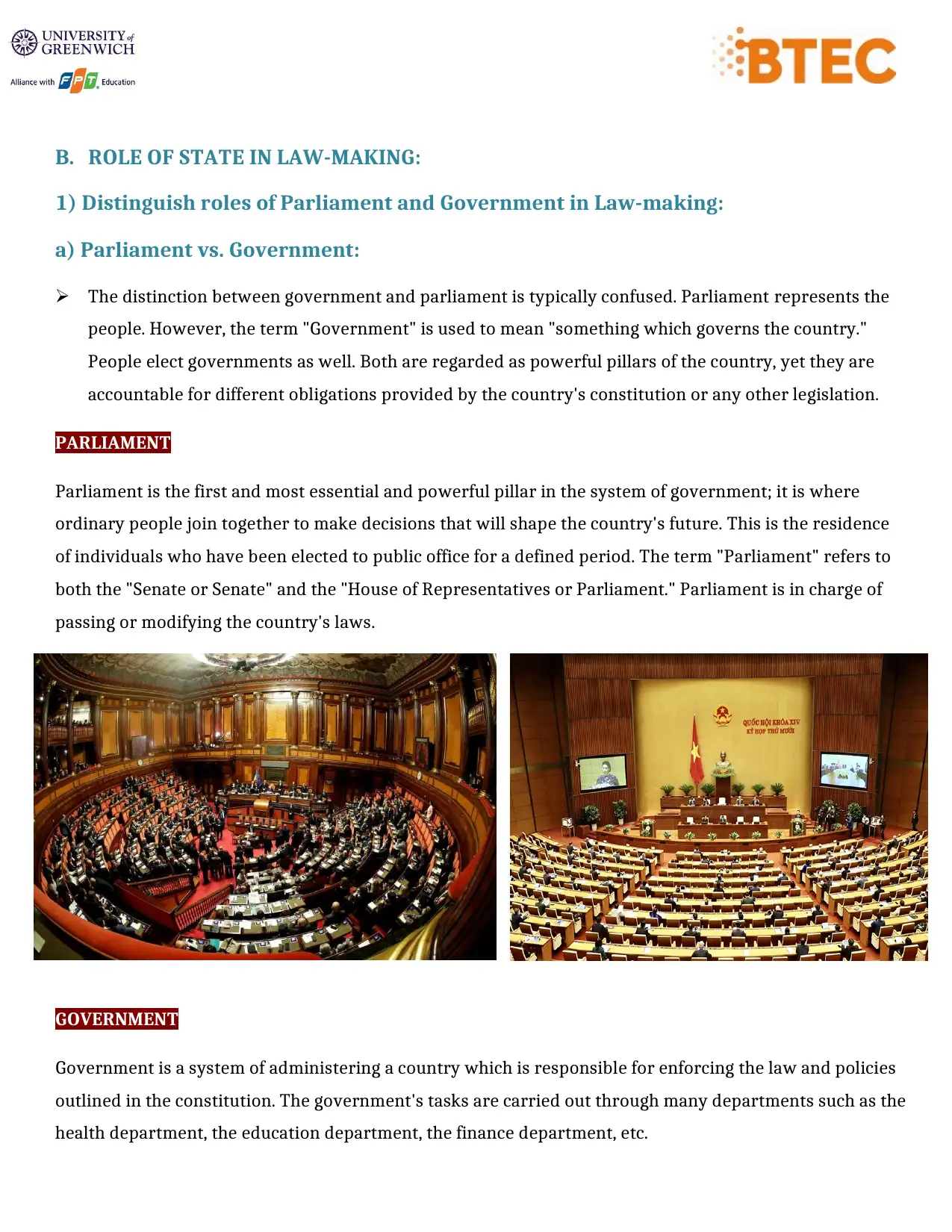
B. ROLE OF STATE IN LAW-MAKING:
1) Distinguish roles of Parliament and Government in Law-making:
a) Parliament vs. Government:
The distinction between government and parliament is typically confused. Parliament represents the
people. However, the term "Government" is used to mean "something which governs the country."
People elect governments as well. Both are regarded as powerful pillars of the country, yet they are
accountable for different obligations provided by the country's constitution or any other legislation.
PARLIAMENT
Parliament is the first and most essential and powerful pillar in the system of government; it is where
ordinary people join together to make decisions that will shape the country's future. This is the residence
of individuals who have been elected to public office for a defined period. The term "Parliament" refers to
both the "Senate or Senate" and the "House of Representatives or Parliament." Parliament is in charge of
passing or modifying the country's laws.
GOVERNMENT
Government is a system of administering a country which is responsible for enforcing the law and policies
outlined in the constitution. The government's tasks are carried out through many departments such as the
health department, the education department, the finance department, etc.
1) Distinguish roles of Parliament and Government in Law-making:
a) Parliament vs. Government:
The distinction between government and parliament is typically confused. Parliament represents the
people. However, the term "Government" is used to mean "something which governs the country."
People elect governments as well. Both are regarded as powerful pillars of the country, yet they are
accountable for different obligations provided by the country's constitution or any other legislation.
PARLIAMENT
Parliament is the first and most essential and powerful pillar in the system of government; it is where
ordinary people join together to make decisions that will shape the country's future. This is the residence
of individuals who have been elected to public office for a defined period. The term "Parliament" refers to
both the "Senate or Senate" and the "House of Representatives or Parliament." Parliament is in charge of
passing or modifying the country's laws.
GOVERNMENT
Government is a system of administering a country which is responsible for enforcing the law and policies
outlined in the constitution. The government's tasks are carried out through many departments such as the
health department, the education department, the finance department, etc.
Secure Best Marks with AI Grader
Need help grading? Try our AI Grader for instant feedback on your assignments.
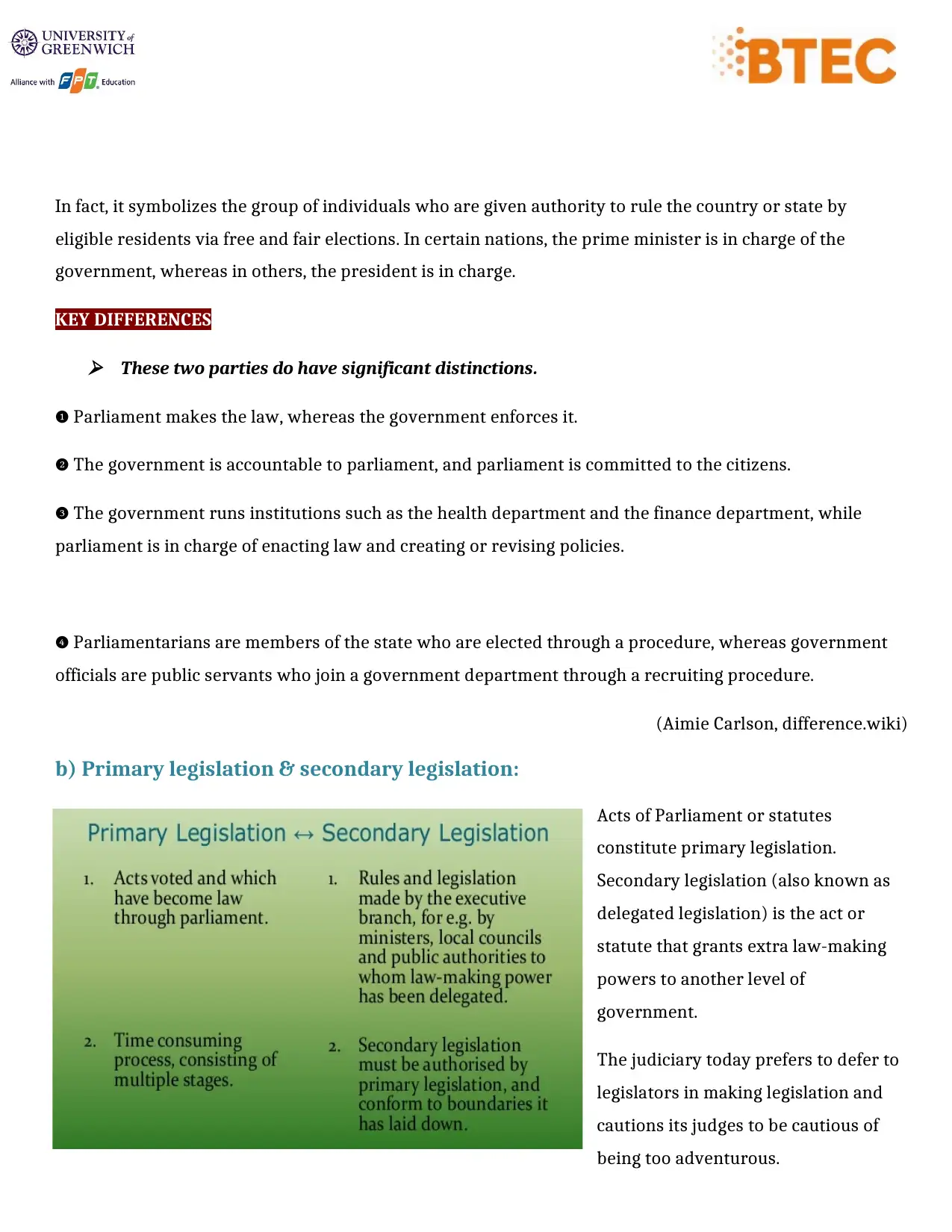
In fact, it symbolizes the group of individuals who are given authority to rule the country or state by
eligible residents via free and fair elections. In certain nations, the prime minister is in charge of the
government, whereas in others, the president is in charge.
KEY DIFFERENCES
These two parties do have significant distinctions.
❶ Parliament makes the law, whereas the government enforces it.
❷ The government is accountable to parliament, and parliament is committed to the citizens.
❸ The government runs institutions such as the health department and the finance department, while
parliament is in charge of enacting law and creating or revising policies.
❹ Parliamentarians are members of the state who are elected through a procedure, whereas government
officials are public servants who join a government department through a recruiting procedure.
(Aimie Carlson, difference.wiki)
b) Primary legislation & secondary legislation:
Acts of Parliament or statutes
constitute primary legislation.
Secondary legislation (also known as
delegated legislation) is the act or
statute that grants extra law-making
powers to another level of
government.
The judiciary today prefers to defer to
legislators in making legislation and
cautions its judges to be cautious of
being too adventurous.
eligible residents via free and fair elections. In certain nations, the prime minister is in charge of the
government, whereas in others, the president is in charge.
KEY DIFFERENCES
These two parties do have significant distinctions.
❶ Parliament makes the law, whereas the government enforces it.
❷ The government is accountable to parliament, and parliament is committed to the citizens.
❸ The government runs institutions such as the health department and the finance department, while
parliament is in charge of enacting law and creating or revising policies.
❹ Parliamentarians are members of the state who are elected through a procedure, whereas government
officials are public servants who join a government department through a recruiting procedure.
(Aimie Carlson, difference.wiki)
b) Primary legislation & secondary legislation:
Acts of Parliament or statutes
constitute primary legislation.
Secondary legislation (also known as
delegated legislation) is the act or
statute that grants extra law-making
powers to another level of
government.
The judiciary today prefers to defer to
legislators in making legislation and
cautions its judges to be cautious of
being too adventurous.
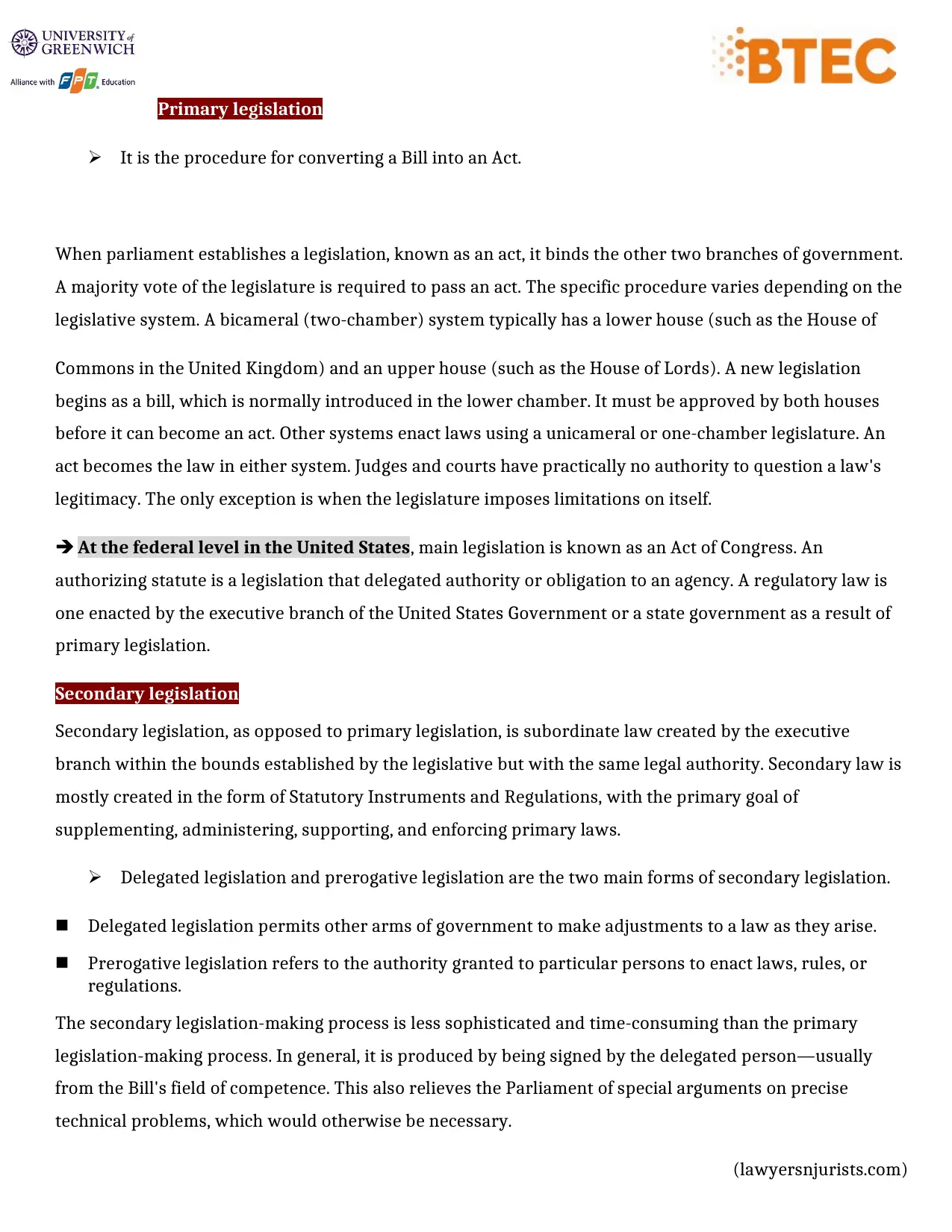
Primary legislation
It is the procedure for converting a Bill into an Act.
When parliament establishes a legislation, known as an act, it binds the other two branches of government.
A majority vote of the legislature is required to pass an act. The specific procedure varies depending on the
legislative system. A bicameral (two-chamber) system typically has a lower house (such as the House of
Commons in the United Kingdom) and an upper house (such as the House of Lords). A new legislation
begins as a bill, which is normally introduced in the lower chamber. It must be approved by both houses
before it can become an act. Other systems enact laws using a unicameral or one-chamber legislature. An
act becomes the law in either system. Judges and courts have practically no authority to question a law's
legitimacy. The only exception is when the legislature imposes limitations on itself.
è At the federal level in the United States, main legislation is known as an Act of Congress. An
authorizing statute is a legislation that delegated authority or obligation to an agency. A regulatory law is
one enacted by the executive branch of the United States Government or a state government as a result of
primary legislation.
Secondary legislation
Secondary legislation, as opposed to primary legislation, is subordinate law created by the executive
branch within the bounds established by the legislative but with the same legal authority. Secondary law is
mostly created in the form of Statutory Instruments and Regulations, with the primary goal of
supplementing, administering, supporting, and enforcing primary laws.
Delegated legislation and prerogative legislation are the two main forms of secondary legislation.
Delegated legislation permits other arms of government to make adjustments to a law as they arise.
Prerogative legislation refers to the authority granted to particular persons to enact laws, rules, or
regulations.
The secondary legislation-making process is less sophisticated and time-consuming than the primary
legislation-making process. In general, it is produced by being signed by the delegated person—usually
from the Bill's field of competence. This also relieves the Parliament of special arguments on precise
technical problems, which would otherwise be necessary.
(lawyersnjurists.com)
It is the procedure for converting a Bill into an Act.
When parliament establishes a legislation, known as an act, it binds the other two branches of government.
A majority vote of the legislature is required to pass an act. The specific procedure varies depending on the
legislative system. A bicameral (two-chamber) system typically has a lower house (such as the House of
Commons in the United Kingdom) and an upper house (such as the House of Lords). A new legislation
begins as a bill, which is normally introduced in the lower chamber. It must be approved by both houses
before it can become an act. Other systems enact laws using a unicameral or one-chamber legislature. An
act becomes the law in either system. Judges and courts have practically no authority to question a law's
legitimacy. The only exception is when the legislature imposes limitations on itself.
è At the federal level in the United States, main legislation is known as an Act of Congress. An
authorizing statute is a legislation that delegated authority or obligation to an agency. A regulatory law is
one enacted by the executive branch of the United States Government or a state government as a result of
primary legislation.
Secondary legislation
Secondary legislation, as opposed to primary legislation, is subordinate law created by the executive
branch within the bounds established by the legislative but with the same legal authority. Secondary law is
mostly created in the form of Statutory Instruments and Regulations, with the primary goal of
supplementing, administering, supporting, and enforcing primary laws.
Delegated legislation and prerogative legislation are the two main forms of secondary legislation.
Delegated legislation permits other arms of government to make adjustments to a law as they arise.
Prerogative legislation refers to the authority granted to particular persons to enact laws, rules, or
regulations.
The secondary legislation-making process is less sophisticated and time-consuming than the primary
legislation-making process. In general, it is produced by being signed by the delegated person—usually
from the Bill's field of competence. This also relieves the Parliament of special arguments on precise
technical problems, which would otherwise be necessary.
(lawyersnjurists.com)
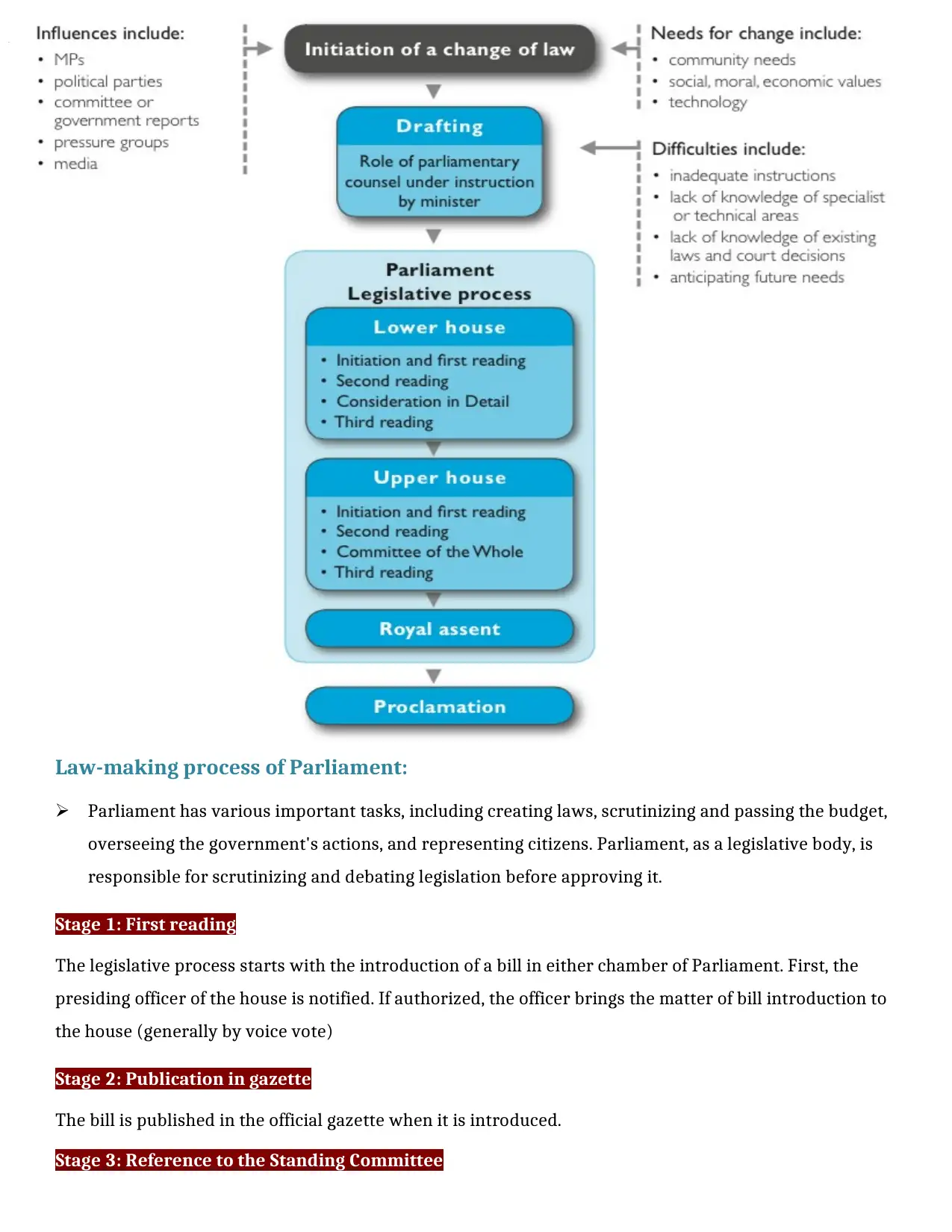
2)
Law-making process of Parliament:
Parliament has various important tasks, including creating laws, scrutinizing and passing the budget,
overseeing the government's actions, and representing citizens. Parliament, as a legislative body, is
responsible for scrutinizing and debating legislation before approving it.
Stage 1: First reading
The legislative process starts with the introduction of a bill in either chamber of Parliament. First, the
presiding officer of the house is notified. If authorized, the officer brings the matter of bill introduction to
the house (generally by voice vote)
Stage 2: Publication in gazette
The bill is published in the official gazette when it is introduced.
Stage 3: Reference to the Standing Committee
Law-making process of Parliament:
Parliament has various important tasks, including creating laws, scrutinizing and passing the budget,
overseeing the government's actions, and representing citizens. Parliament, as a legislative body, is
responsible for scrutinizing and debating legislation before approving it.
Stage 1: First reading
The legislative process starts with the introduction of a bill in either chamber of Parliament. First, the
presiding officer of the house is notified. If authorized, the officer brings the matter of bill introduction to
the house (generally by voice vote)
Stage 2: Publication in gazette
The bill is published in the official gazette when it is introduced.
Stage 3: Reference to the Standing Committee
Paraphrase This Document
Need a fresh take? Get an instant paraphrase of this document with our AI Paraphraser
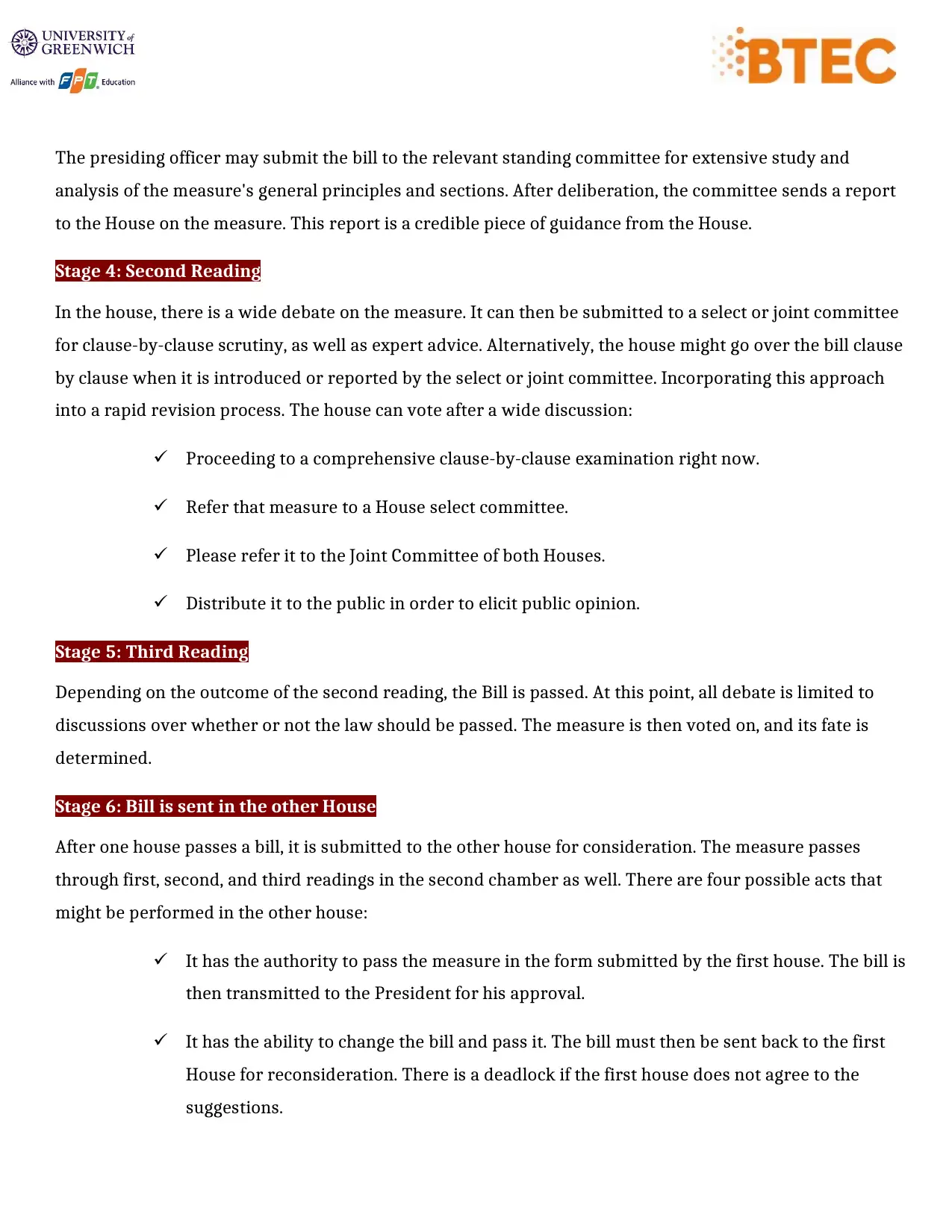
The presiding officer may submit the bill to the relevant standing committee for extensive study and
analysis of the measure's general principles and sections. After deliberation, the committee sends a report
to the House on the measure. This report is a credible piece of guidance from the House.
Stage 4: Second Reading
In the house, there is a wide debate on the measure. It can then be submitted to a select or joint committee
for clause-by-clause scrutiny, as well as expert advice. Alternatively, the house might go over the bill clause
by clause when it is introduced or reported by the select or joint committee. Incorporating this approach
into a rapid revision process. The house can vote after a wide discussion:
Proceeding to a comprehensive clause-by-clause examination right now.
Refer that measure to a House select committee.
Please refer it to the Joint Committee of both Houses.
Distribute it to the public in order to elicit public opinion.
Stage 5: Third Reading
Depending on the outcome of the second reading, the Bill is passed. At this point, all debate is limited to
discussions over whether or not the law should be passed. The measure is then voted on, and its fate is
determined.
Stage 6: Bill is sent in the other House
After one house passes a bill, it is submitted to the other house for consideration. The measure passes
through first, second, and third readings in the second chamber as well. There are four possible acts that
might be performed in the other house:
It has the authority to pass the measure in the form submitted by the first house. The bill is
then transmitted to the President for his approval.
It has the ability to change the bill and pass it. The bill must then be sent back to the first
House for reconsideration. There is a deadlock if the first house does not agree to the
suggestions.
analysis of the measure's general principles and sections. After deliberation, the committee sends a report
to the House on the measure. This report is a credible piece of guidance from the House.
Stage 4: Second Reading
In the house, there is a wide debate on the measure. It can then be submitted to a select or joint committee
for clause-by-clause scrutiny, as well as expert advice. Alternatively, the house might go over the bill clause
by clause when it is introduced or reported by the select or joint committee. Incorporating this approach
into a rapid revision process. The house can vote after a wide discussion:
Proceeding to a comprehensive clause-by-clause examination right now.
Refer that measure to a House select committee.
Please refer it to the Joint Committee of both Houses.
Distribute it to the public in order to elicit public opinion.
Stage 5: Third Reading
Depending on the outcome of the second reading, the Bill is passed. At this point, all debate is limited to
discussions over whether or not the law should be passed. The measure is then voted on, and its fate is
determined.
Stage 6: Bill is sent in the other House
After one house passes a bill, it is submitted to the other house for consideration. The measure passes
through first, second, and third readings in the second chamber as well. There are four possible acts that
might be performed in the other house:
It has the authority to pass the measure in the form submitted by the first house. The bill is
then transmitted to the President for his approval.
It has the ability to change the bill and pass it. The bill must then be sent back to the first
House for reconsideration. There is a deadlock if the first house does not agree to the
suggestions.
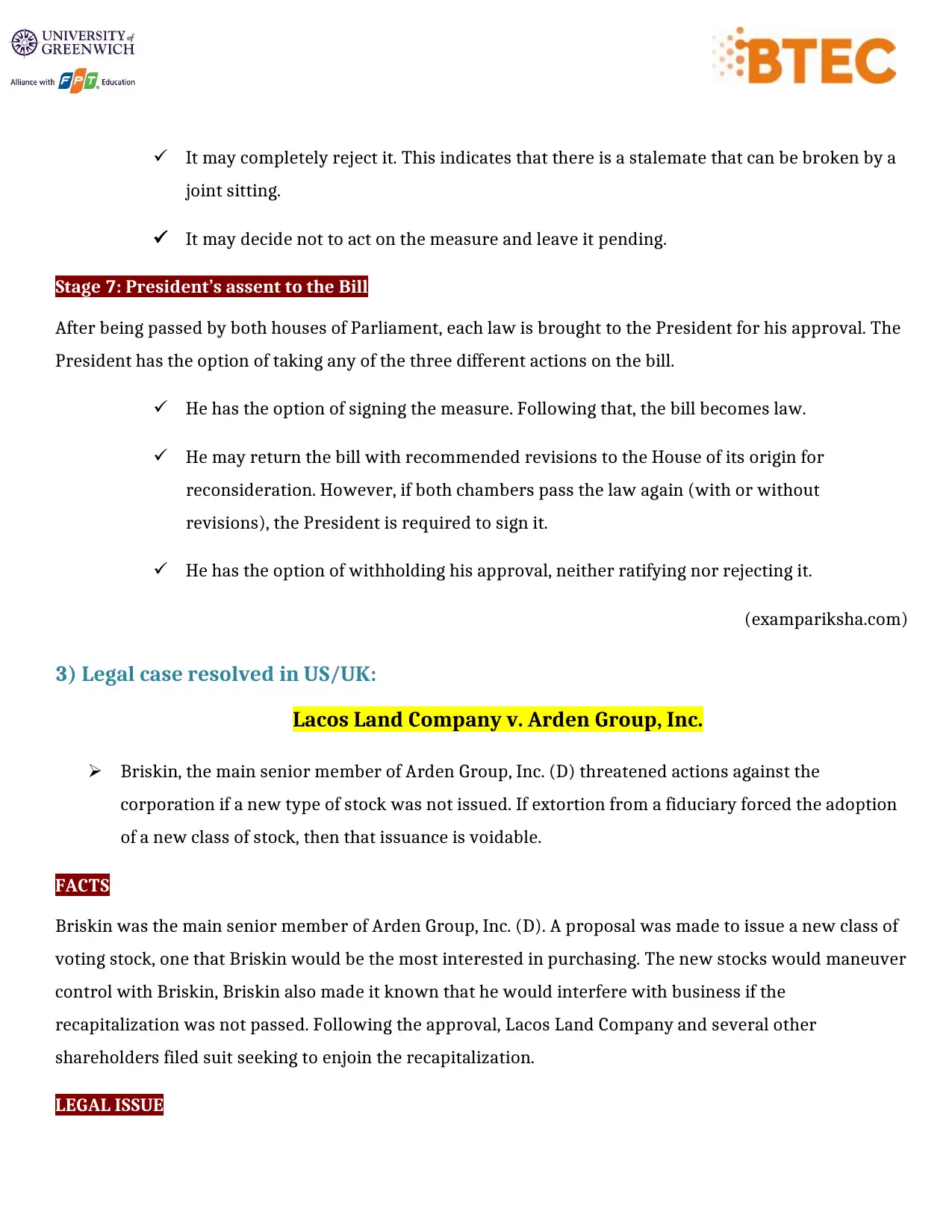
It may completely reject it. This indicates that there is a stalemate that can be broken by a
joint sitting.
It may decide not to act on the measure and leave it pending.
Stage 7: President’s assent to the Bill
After being passed by both houses of Parliament, each law is brought to the President for his approval. The
President has the option of taking any of the three different actions on the bill.
He has the option of signing the measure. Following that, the bill becomes law.
He may return the bill with recommended revisions to the House of its origin for
reconsideration. However, if both chambers pass the law again (with or without
revisions), the President is required to sign it.
He has the option of withholding his approval, neither ratifying nor rejecting it.
(exampariksha.com)
3) Legal case resolved in US/UK:
Lacos Land Company v. Arden Group, Inc.
Briskin, the main senior member of Arden Group, Inc. (D) threatened actions against the
corporation if a new type of stock was not issued. If extortion from a fiduciary forced the adoption
of a new class of stock, then that issuance is voidable.
FACTS
Briskin was the main senior member of Arden Group, Inc. (D). A proposal was made to issue a new class of
voting stock, one that Briskin would be the most interested in purchasing. The new stocks would maneuver
control with Briskin, Briskin also made it known that he would interfere with business if the
recapitalization was not passed. Following the approval, Lacos Land Company and several other
shareholders filed suit seeking to enjoin the recapitalization.
LEGAL ISSUE
joint sitting.
It may decide not to act on the measure and leave it pending.
Stage 7: President’s assent to the Bill
After being passed by both houses of Parliament, each law is brought to the President for his approval. The
President has the option of taking any of the three different actions on the bill.
He has the option of signing the measure. Following that, the bill becomes law.
He may return the bill with recommended revisions to the House of its origin for
reconsideration. However, if both chambers pass the law again (with or without
revisions), the President is required to sign it.
He has the option of withholding his approval, neither ratifying nor rejecting it.
(exampariksha.com)
3) Legal case resolved in US/UK:
Lacos Land Company v. Arden Group, Inc.
Briskin, the main senior member of Arden Group, Inc. (D) threatened actions against the
corporation if a new type of stock was not issued. If extortion from a fiduciary forced the adoption
of a new class of stock, then that issuance is voidable.
FACTS
Briskin was the main senior member of Arden Group, Inc. (D). A proposal was made to issue a new class of
voting stock, one that Briskin would be the most interested in purchasing. The new stocks would maneuver
control with Briskin, Briskin also made it known that he would interfere with business if the
recapitalization was not passed. Following the approval, Lacos Land Company and several other
shareholders filed suit seeking to enjoin the recapitalization.
LEGAL ISSUE
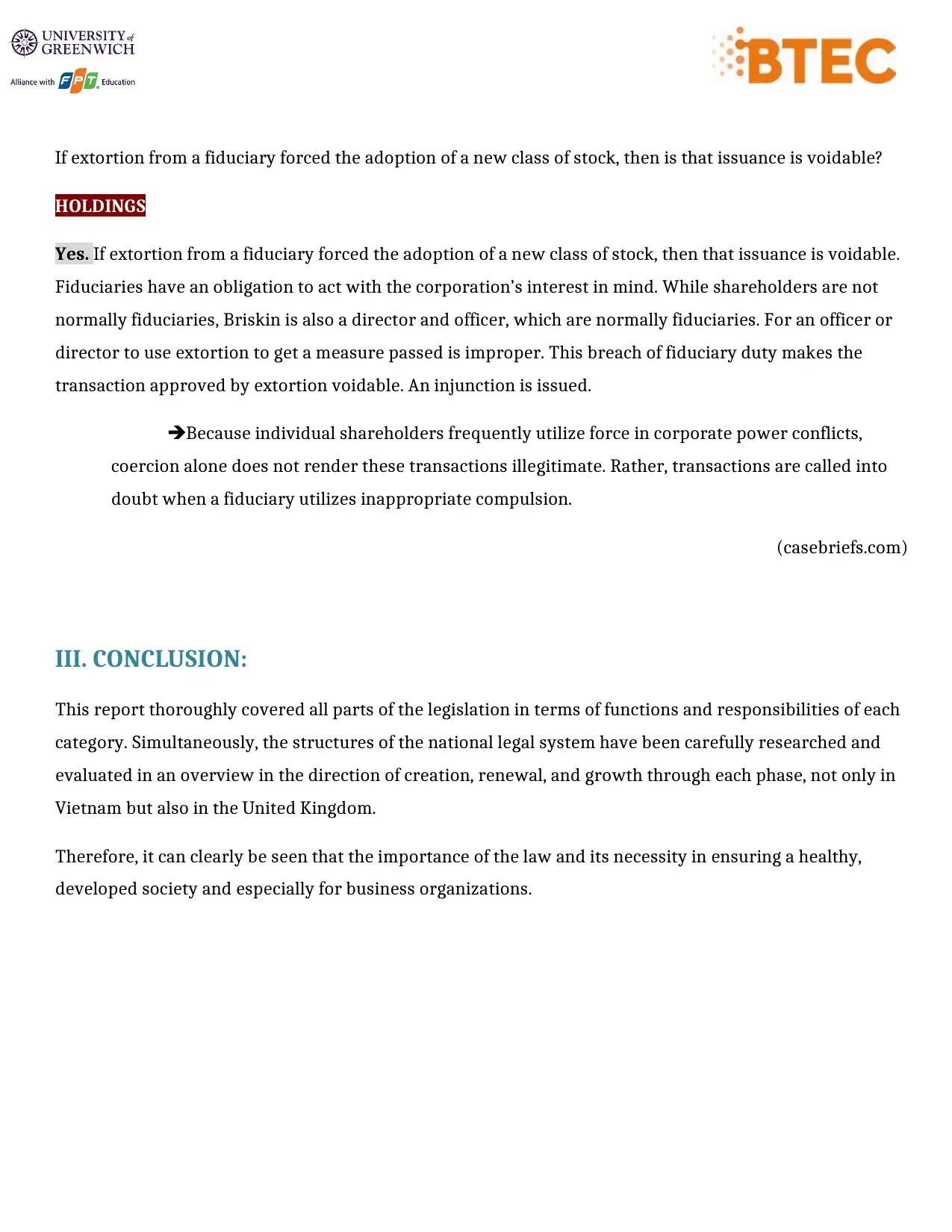
If extortion from a fiduciary forced the adoption of a new class of stock, then is that issuance is voidable?
HOLDINGS
Yes. If extortion from a fiduciary forced the adoption of a new class of stock, then that issuance is voidable.
Fiduciaries have an obligation to act with the corporation’s interest in mind. While shareholders are not
normally fiduciaries, Briskin is also a director and officer, which are normally fiduciaries. For an officer or
director to use extortion to get a measure passed is improper. This breach of fiduciary duty makes the
transaction approved by extortion voidable. An injunction is issued.
èBecause individual shareholders frequently utilize force in corporate power conflicts,
coercion alone does not render these transactions illegitimate. Rather, transactions are called into
doubt when a fiduciary utilizes inappropriate compulsion.
(casebriefs.com)
III. CONCLUSION:
This report thoroughly covered all parts of the legislation in terms of functions and responsibilities of each
category. Simultaneously, the structures of the national legal system have been carefully researched and
evaluated in an overview in the direction of creation, renewal, and growth through each phase, not only in
Vietnam but also in the United Kingdom.
Therefore, it can clearly be seen that the importance of the law and its necessity in ensuring a healthy,
developed society and especially for business organizations.
HOLDINGS
Yes. If extortion from a fiduciary forced the adoption of a new class of stock, then that issuance is voidable.
Fiduciaries have an obligation to act with the corporation’s interest in mind. While shareholders are not
normally fiduciaries, Briskin is also a director and officer, which are normally fiduciaries. For an officer or
director to use extortion to get a measure passed is improper. This breach of fiduciary duty makes the
transaction approved by extortion voidable. An injunction is issued.
èBecause individual shareholders frequently utilize force in corporate power conflicts,
coercion alone does not render these transactions illegitimate. Rather, transactions are called into
doubt when a fiduciary utilizes inappropriate compulsion.
(casebriefs.com)
III. CONCLUSION:
This report thoroughly covered all parts of the legislation in terms of functions and responsibilities of each
category. Simultaneously, the structures of the national legal system have been carefully researched and
evaluated in an overview in the direction of creation, renewal, and growth through each phase, not only in
Vietnam but also in the United Kingdom.
Therefore, it can clearly be seen that the importance of the law and its necessity in ensuring a healthy,
developed society and especially for business organizations.
Secure Best Marks with AI Grader
Need help grading? Try our AI Grader for instant feedback on your assignments.
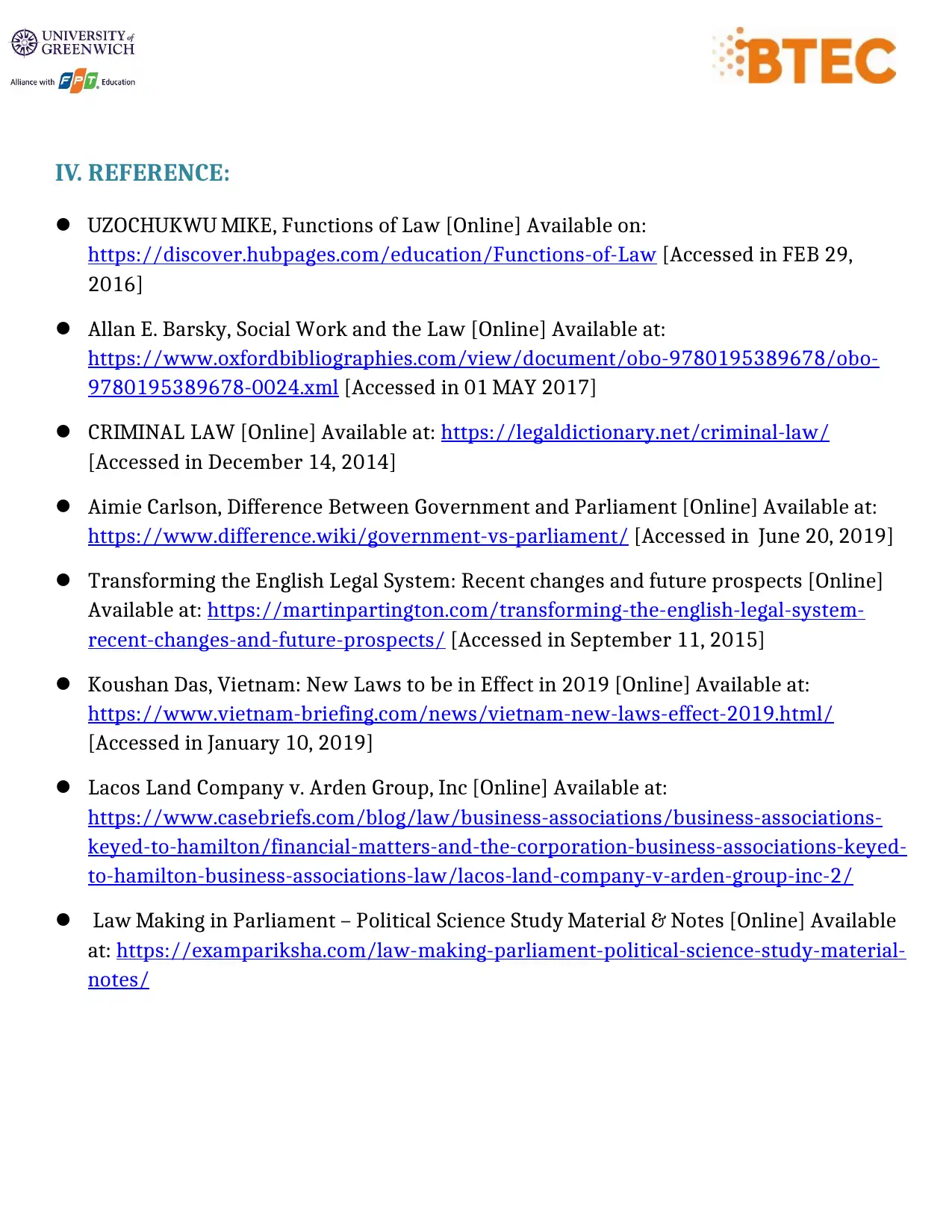
IV. REFERENCE:
UZOCHUKWU MIKE, Functions of Law [Online] Available on:
https://discover.hubpages.com/education/Functions-of-Law [Accessed in FEB 29,
2016]
Allan E. Barsky, Social Work and the Law [Online] Available at:
https://www.oxfordbibliographies.com/view/document/obo-9780195389678/obo-
9780195389678-0024.xml [Accessed in 01 MAY 2017]
CRIMINAL LAW [Online] Available at: https://legaldictionary.net/criminal-law/
[Accessed in December 14, 2014]
Aimie Carlson, Difference Between Government and Parliament [Online] Available at:
https://www.difference.wiki/government-vs-parliament/ [Accessed in June 20, 2019]
Transforming the English Legal System: Recent changes and future prospects [Online]
Available at: https://martinpartington.com/transforming-the-english-legal-system-
recent-changes-and-future-prospects/ [Accessed in September 11, 2015]
Koushan Das, Vietnam: New Laws to be in Effect in 2019 [Online] Available at:
https://www.vietnam-briefing.com/news/vietnam-new-laws-effect-2019.html/
[Accessed in January 10, 2019]
Lacos Land Company v. Arden Group, Inc [Online] Available at:
https://www.casebriefs.com/blog/law/business-associations/business-associations-
keyed-to-hamilton/financial-matters-and-the-corporation-business-associations-keyed-
to-hamilton-business-associations-law/lacos-land-company-v-arden-group-inc-2/
Law Making in Parliament – Political Science Study Material & Notes [Online] Available
at: https://exampariksha.com/law-making-parliament-political-science-study-material-
notes/
UZOCHUKWU MIKE, Functions of Law [Online] Available on:
https://discover.hubpages.com/education/Functions-of-Law [Accessed in FEB 29,
2016]
Allan E. Barsky, Social Work and the Law [Online] Available at:
https://www.oxfordbibliographies.com/view/document/obo-9780195389678/obo-
9780195389678-0024.xml [Accessed in 01 MAY 2017]
CRIMINAL LAW [Online] Available at: https://legaldictionary.net/criminal-law/
[Accessed in December 14, 2014]
Aimie Carlson, Difference Between Government and Parliament [Online] Available at:
https://www.difference.wiki/government-vs-parliament/ [Accessed in June 20, 2019]
Transforming the English Legal System: Recent changes and future prospects [Online]
Available at: https://martinpartington.com/transforming-the-english-legal-system-
recent-changes-and-future-prospects/ [Accessed in September 11, 2015]
Koushan Das, Vietnam: New Laws to be in Effect in 2019 [Online] Available at:
https://www.vietnam-briefing.com/news/vietnam-new-laws-effect-2019.html/
[Accessed in January 10, 2019]
Lacos Land Company v. Arden Group, Inc [Online] Available at:
https://www.casebriefs.com/blog/law/business-associations/business-associations-
keyed-to-hamilton/financial-matters-and-the-corporation-business-associations-keyed-
to-hamilton-business-associations-law/lacos-land-company-v-arden-group-inc-2/
Law Making in Parliament – Political Science Study Material & Notes [Online] Available
at: https://exampariksha.com/law-making-parliament-political-science-study-material-
notes/


1 out of 31
Related Documents
Your All-in-One AI-Powered Toolkit for Academic Success.
+13062052269
info@desklib.com
Available 24*7 on WhatsApp / Email
![[object Object]](/_next/static/media/star-bottom.7253800d.svg)
Unlock your academic potential
© 2024 | Zucol Services PVT LTD | All rights reserved.





